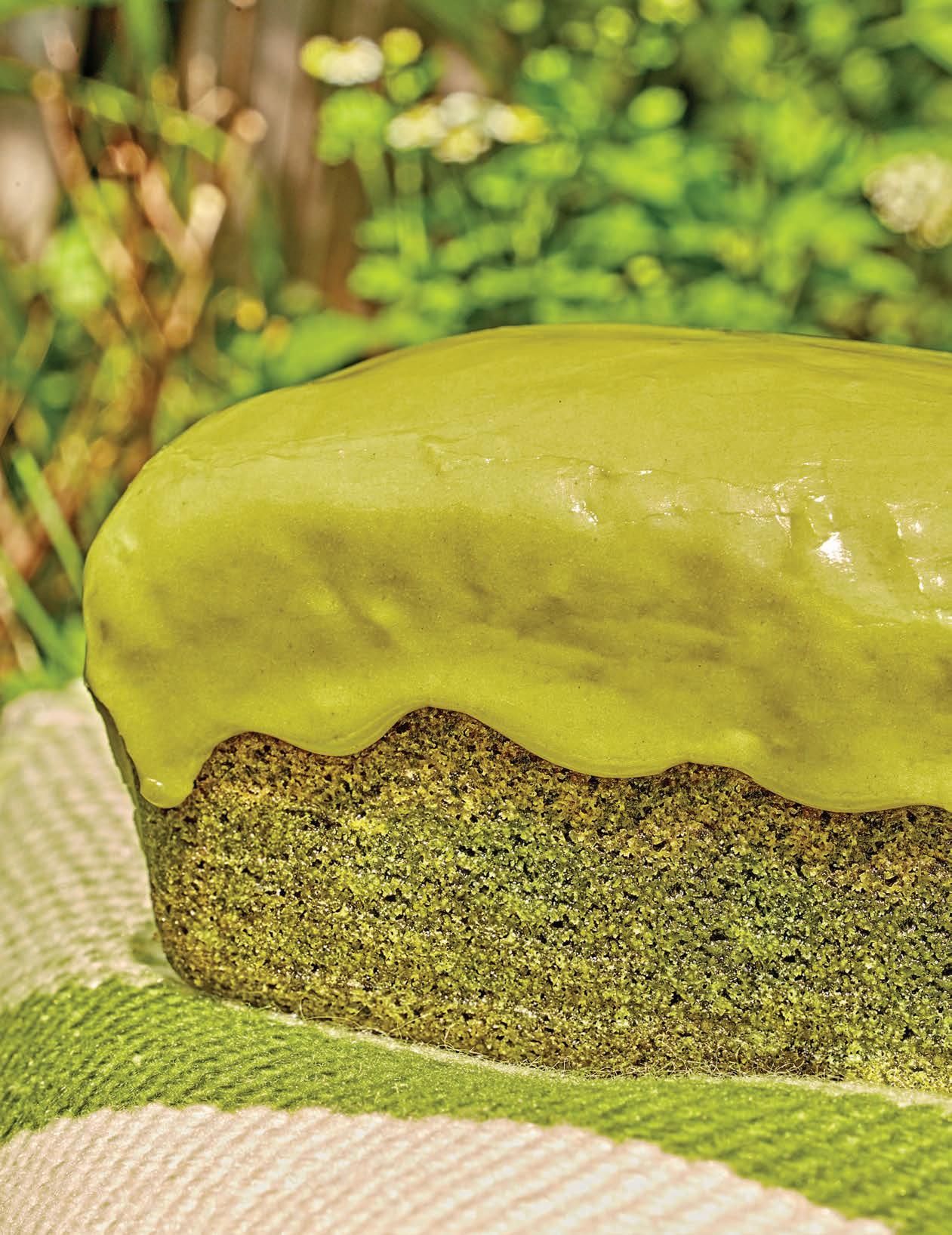
MEMBER OF EDIBLE COMMUNITIES | NO. 1 FALL 2023 The Silver Fork | Dominique Leach | Future of Food | Bendición Bottle Shop | Edible for Kids Heritage Prairie Farm | The City That Loves to Grow | Bookclub | Uncovering the Plant edible CHICAGO Second Spring

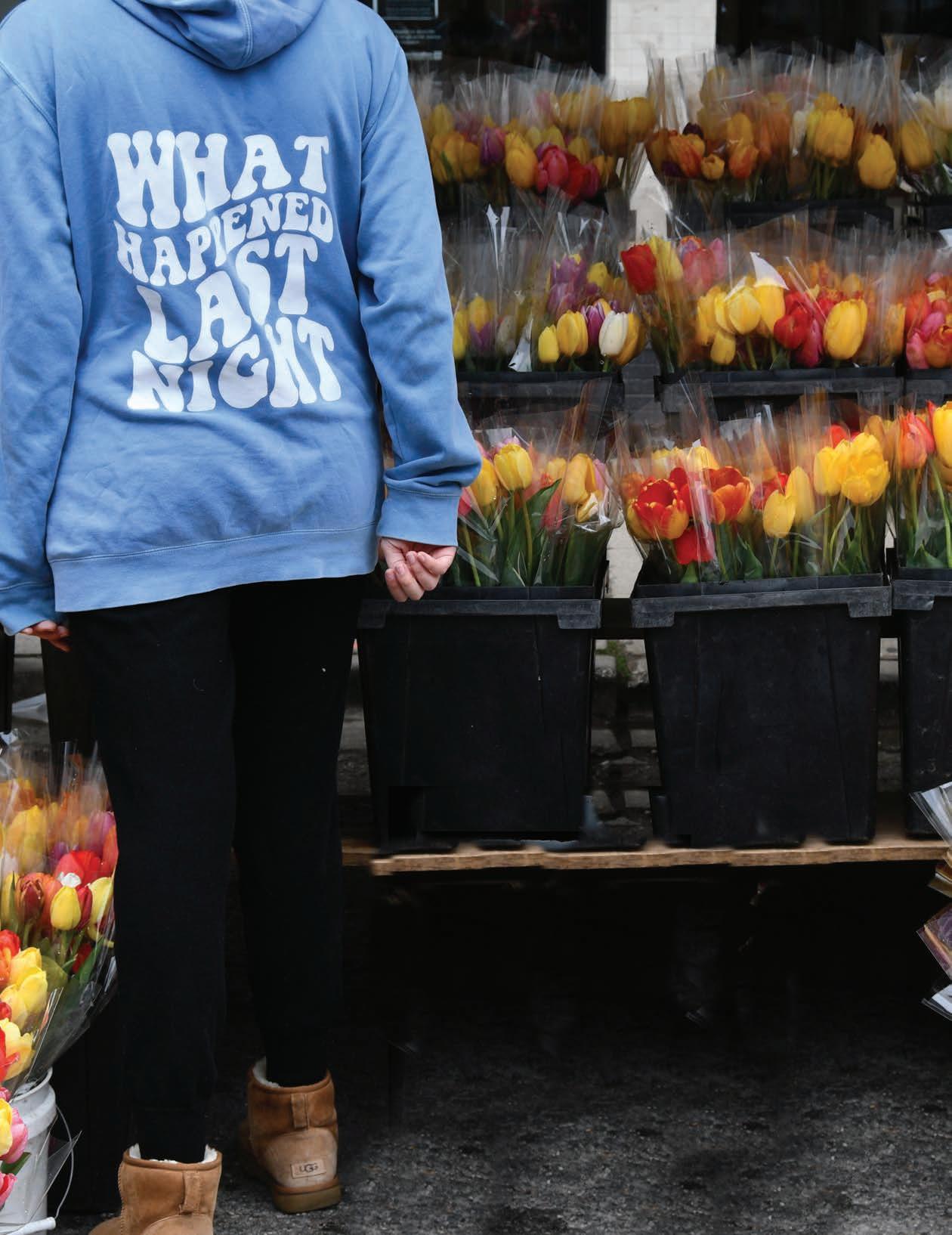
CONTENTS Fall 2023 Letter from the Editor Contributor Bites Notable Edible: The Silver Fork Program at the Center on Halsted Notablbe Edible: Chef Dominique Leach The Future of Food is Collective Farmers Market Guide Ginger Blueberry Shrub Mocktail Edible Finds: Bendición Bottle Shop CHICAGO: The City That Loves to Grow Second Spring: Nettle and Matcha Cake Heritage Prairie Farm Edible for Kids™ created in partnership with Barefoot Books, Inc. Food for Thought Bookclub Second Bite: Uncovering the Plant On the cover: Emily Spurlin's Nettle Matcha Cake Photo by Laura Scherb This page: Flowers at Division Street Market Photo by Megan Marshall 2 3 5 6 8 12 14 16 18 22 26 31 35 37
edible CHICAGO Fall 2023
PUBLISHER and EDITOR IN CHIEF
Megan Marshall
COPY EDITOR
Megan Ashley
ADVERTISING
info@ediblechicago.com
PRINT DESIGN AND LAYOUT
Bruce Cole
CONTRIBUTORS
Dario Durham
Ellen Osborne
Emily Spurlin
JT Newman
Laura Scherb
Mandy Moody
Rachel Morrison
Sara Faddah
Contact Us
Edible Chicago PO Box 47045 Chicago, IL 60647
info@ediblechicago.com
SUBSCRIPTIONS
Subscriptions and supporting memberships are available starting at $45 annually. Learn more at ediblechicago.com/ subscribe-to-edible-chicago
Edible Chicago is published quarterly and distributed throughout Chicago and the surrounding suburbs. All rights reserved. No part of this publication may be used without written permission from the publisher. ©2023. Every effort is made to avoid errors, misspellings, and omissions. If an error comes to your attention, please accept our sincere apologies and notify us. Thank you.
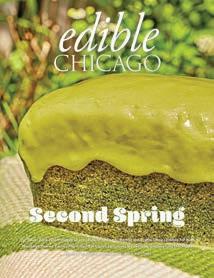
LETTER FROM THE EDITOR
Far too often in conversations discussing the best dining, food innovations, and the movers and shakers of our food system, the Midwest is merely a supporting character. Coastal cities reign supreme. But, to those of us lucky enough to live and work in Chicago, we know the truth. No city endures, builds, and celebrates like ours.
A bustling, humble, and hardworking city bordered by the Great Lakes and the best of midwestern agriculture, Chicago sustains.
It is our unique privilege to revive Edible Chicago. Our purpose is to uplift the makers, producers, and innovators building a more resilient and sustainable food system in Chicago and the surrounding area.
I’ve been met with enthusiasm since this reboot was just an idea, and it's in front of you today because of a community of contributors coming together. There is a palpable, shared eagerness to craft something that truly captures the breadth and depth of Chicago's food system. And the stories here in our ‘first pancake’ reflect that.
I hope you enjoy the cover story and recipe as much as I do. Emily’s writing so beautifully captures our intent with the revival of the publication and the spirit of second chances.
This is our second spring.
Thank you in advance for your support of this publication. This will be a magazine for Chicago and by Chicago, and one of which you can be proud. I can’t wait to share your story.
Megan Marshall (she/her) Publisher and Editor-in-Chief
megan@ediblechicago.com

2 | EDIBLE CHICAGO FALL 202 3
Dario Durham (he/him) is a Chicagoan to the core and has dedicated the last couple of years to exploring all 77 community areas in Chicago along side his partner Sara. His experience as a comedian allows him to deliver the history facts on the podcast in the most entertaining way! He has also spent years photographing the city from all its angles.


@ super_dario_bro
Ellen Osborne (she/her) has spent her career in the food and grocery industries, previously as a category manager at multiple grocery stores in Toronto, Canada. She is an avid home cook, and is passionate about locally sourced food and unique food products. She currently lives in Geneva with her husband and daughter. basicallyhealthy.com



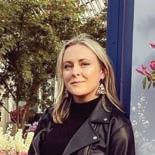
Emily Spurlin (she/her) is a Chicago-based pastry chef, herbalist, floral designer, and visual artist. In weaving her many curiosities together, she strives to explore the intersections of creativity, nature, and play. She is a passionate advocate for sustainability in respect to our planet and the human bodies that grow, produce, and prepare our food. Her work has been featured in The New York Times, Bon Appetit, Chicago Magazine, and more. Emily is a 2020 James Beard Semifinalist and in the 2018 Class of StarChefs Rising Stars. @sourbittersalty
JT Goehring-Newman (they/them) is a Chicago-based food writer who's written for outlets such as the Chicago Reader, Third Coast Review, Gaper's Block, The Chicago Not-For-Tourists Guide, Windy City Times, Bust magazine, and many more. They run a food-based agency, Yummmedia, creating food content in all media for clients and for fun. Listen to their podcast Lez Eat, which you can find wherever you listen. They live in Lincoln Square with their wife, Toni, a tween child, Theo, and a menagerie of furry nerds. @jtmakesityummy
Laura Scherb (she/her) is a food photographer, stylist, and writer based in Chicago. Her studio work focuses on storytelling in food photography, and her work has been featured on Eater, The Spruce Eats, and The TODAY Show. Previously, she has contributed to Life & Thyme and Different Leaf magazines. More of her work, including recipes, photographs, and writing, can be found on her Substack, Page & Plate. @pageandplatestudio
Mandy Moody (she/her) is a purpose-driven, people-focused leader with more than 15 years experience in the nonprofit sector. As the Executive Director of Chicago's Green City Market, she turns ideas into action, providing the leadership necessary to achieve the organization's mission to secure the future of food through deepening support for sustainable farmers, educating our community, and expanding access to locally-grown food. Moody also serves on the Board of Directors of the national Farmers Market Coalition and co-facilitates the Chicago Farmers Market Collective. linkedin.com/in/mandyhmoody/
Rachel Morrison (she/her) is a marketing and brand expert, and writer focused on food, beverage, travel, and transportation. Her recipes combine local and seasonal ingredients with new and exciting brands. She’s an endless supporter of sustainable, local, and women and queer-owned businesses. Bringing people together is what drives Rachel. You can often find her teaching fitness classes, training for an upcoming run, overfilling her tote bag at the farmers market, and trying out the latest food or drink craze in Chicago. @beeradjacent
Sara Faddah (she/her), a Jordan-born food enthusiast, developed her passion for food at an early age in her grandmother's kitchen. From working in restaurants to exploring Mexican cuisine while living there, her love for culinary delights grew. Now, alongside her partner Dario, she hosts a podcast uncovering the history and diverse foods of Chicago, having tasted dishes from around the globe right here in the 77 community areas!

@77flavorschi

ediblechicago.com | 3 CONTRIBUTOR BITES
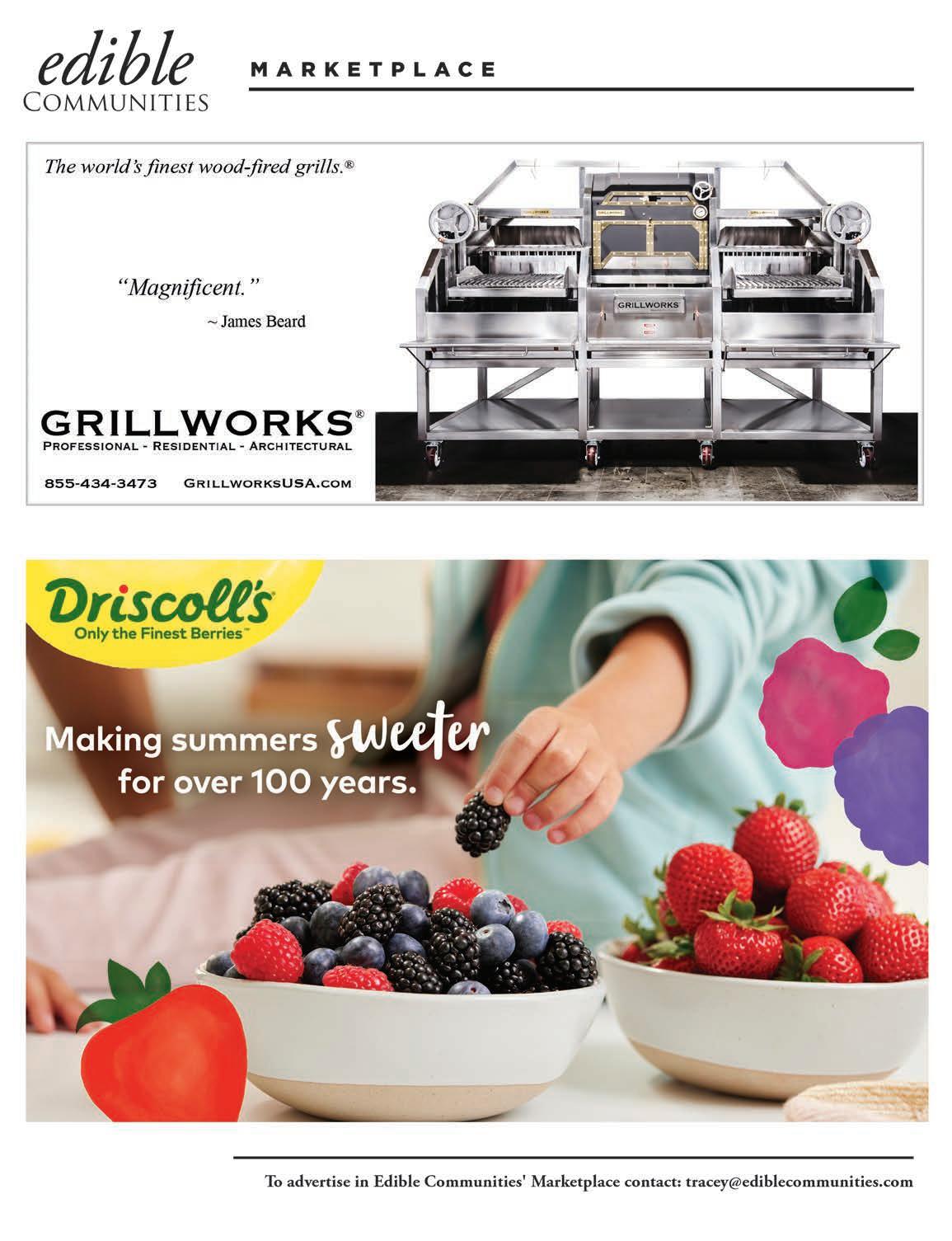
4 | EDIBLE CHICAGO FALL 202 3
The Silver Fork Program at the Center on Halsted
by JT Newman
Entering a kitchen job can be intimidating and nerve-wracking. The noise, heat, and sense of urgency are overwhelming during even the slowest services. These experiences can seem extra daunting if you are a BIPOC person, a woman, and or a member of the LGBTQIA+ community. The culture of most kitchens, while there has been a fraction of improvement in the last few years, can still be very bro-ey, white, and very, very male.
Enter the Silver Fork Program at the Center on Halsted, a community center in Lakeview.
The program, led by seasoned LGBTQIA+ Chefs Urban and Tera Murray, bills itself as a "culinary arts and job readiness program hosted by the Center on Halsted. It is ideal for adults who want to enter or re-enter the hospitality industry. Participants experience intensive culinary training coupled with personal and professional development, job readiness, and career counseling."
Chef Urban described the challenges of being LGBTQIA+ in a kitchen, "It always is [a challenge]. And it's a shame because there's room for all of us. And honestly, that [diversity] will make the food taste better. Let's be real. You know, we all have our
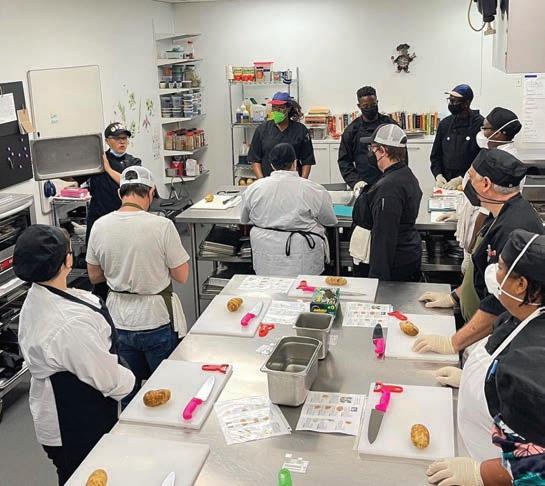
little bit of flavor and personality to throw in the dish. A diverse kitchen tastes better for sure."
The seven-week program includes everything a person needs to enter the culinary field, and the Chefs tailor the experience to participants' goals. "We offer three certified classes: allergen training, sanitation training, and the Bassett license. The Bassett license is to serve alcohol. We don't have that as part of our program. But we want to make sure you have all the tools in your toolkit." Urban continued.
In the program, novice chefs learn proper knife skills and cuts, the French "mother sauces," and work through a curriculum that covers sauce, soups, egg cookery, pasta, sides, veggies, grains, quick breads and pastry, meats, and main dishes. Late summer program participants also enjoy the fruits and veggies grown on the rooftop garden at the Center on Halsted (which is closed to the public). The program takes field trips to places such as Barilla America, Cargill, the kitchens at Wrigley Field, and Dom's Fresh Market. Silver Fork assists with resume writing, kitchen math, job readiness, and job placement. And participants leave the program with a solid foundation to build their dream culinary career.
Chef Urban offered this advice to would-be chefs and food professionals: "There are so many ways to find success and joy in this industry. If you feel yourself getting burnt out in one area, it's time to move on to the next step in your journey. Chicago is amazing. There are so many opportunities. I want to throw this out, though: Never burn a bridge. I've been here 20 years and I am living the most fullcircle world right now. I keep going back to the people and places that I learned about when I first moved here and I'm creating new relationships constantly. I encourage new chefs to go out there and network, have fun and cook your heart out."
The Silver Fork Program runs 4-5 times a year at the Center on Halsted at 3656 N. Halsted Street in Chicago and is entirely free to participants. (There is a maximum income level to prioritize low-income students.) The cohorts meet Tuesdays, Wednesdays, and Thursdays from 10:00 a.m. to 3:00 p.m., and students become fully certified in food prep and serving alcoholic beverages. See www. centeronhalsted.org/silverfork for more information or to apply.
ediblechicago.com | 5
e NOTABLE EDIBLE
Photo: The Center on Halsted
Lexington Betty's Dominique Leach
By JT Newman
Chicago Chef Dominique Leach is on fire. With her wife and business partner, Tanisha Griffin, she built Lexington Betty’s Smokehouse: first a food truck and now two brick-and-mortar locations in Galewood and Pullman. Chef Leach is a classically trained chef turned nationally-recognized pitmaster. She was catapulted into the national spotlight on The Food Network’s Chopped “Playing With Fire” season in 2021 as a contestant.
As the Chef/Co-Owner of Lexington Betty’s, Chef Leach has drawn attention from the press far and wide, including the Chicago Tribune, Block Club Chicago, and most recently, a feature in Food & Wine magazine, saying she is staking a claim for black, queer women in the often male-dominated world of BBQ. And Good Morning America named her smoked meats the “Best BBQ in Chicago.”
Her resume includes stints in the event departments of Spiaggia, the
Four Seasons Hotel, and the Art Institute of Chicago. She has booked with Chef Brian Williams, worked under JamesBeard Award-Winning Author and chef Raghavan Iyer and worked for the Michelin-starred Spiaggia chef/partner Tony Mantuano. After that, she was an executive chef at Zelda’s Kosher Catering. She then launched her own catering business with her wife, Tanisha, and founded Lexington Betty’s, named after her Granny Betty King from Lexington, Mississippi.
Chef Leach has been a featured chef on Food Network’s “Chopped” and has appeared as both a contestant and a judge on the Food Network Canada’s “Fire Masters.” Over the summer, Chef Leach appeared on the Food Network’s BBQ Brawl alongside superstar Chefs Anne Burrell, Bobby Flay, and Sunny Anderson.
In early 2023, she launched her line of Waygu Beef Franks, now available at 44
locations of Mariano’s throughout Chicagoland. The beef franks are made from responsibly raised cattle from Vander Farmers, a family-owned company and the leading source of F1 American Wagyu in the Midwest. The release marks the first of multiple BBQ products to be announced for local and national distribution in 2023 by Chef Leach and Vander Farmers.
You
can find Chef Leach on Season
Four of BBQ Brawl on the Food Network (new episodes through September 4) and her Waygu Beef Franks, Andouille Sausage, and BBQ Sauce at Mariano’s throughout Chicagoland.
Follow Chef Leach on social media : @lexingtonbettysmokehouse on Instagram and TikTok. @chefdominiqueleach on Instagram.
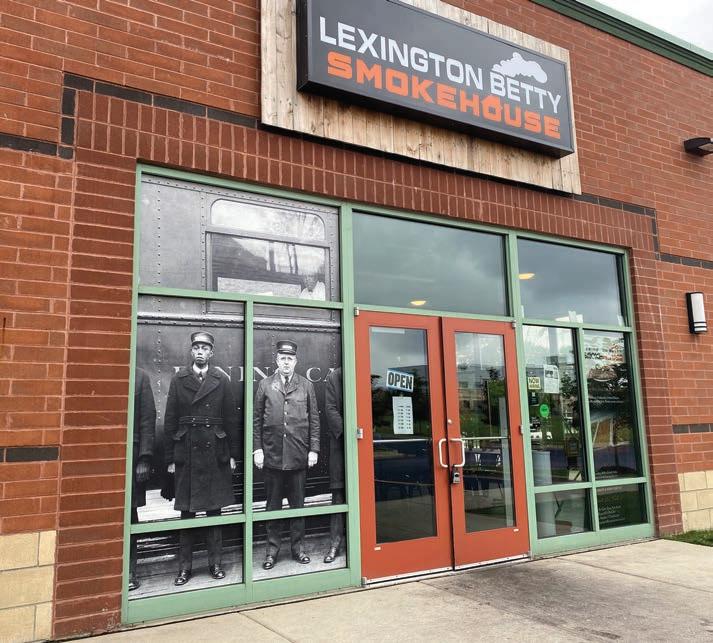
6 | EDIBLE CHICAGO FALL 202 3
NOTABLE EDIBLE
Photo: Barb Marshall e
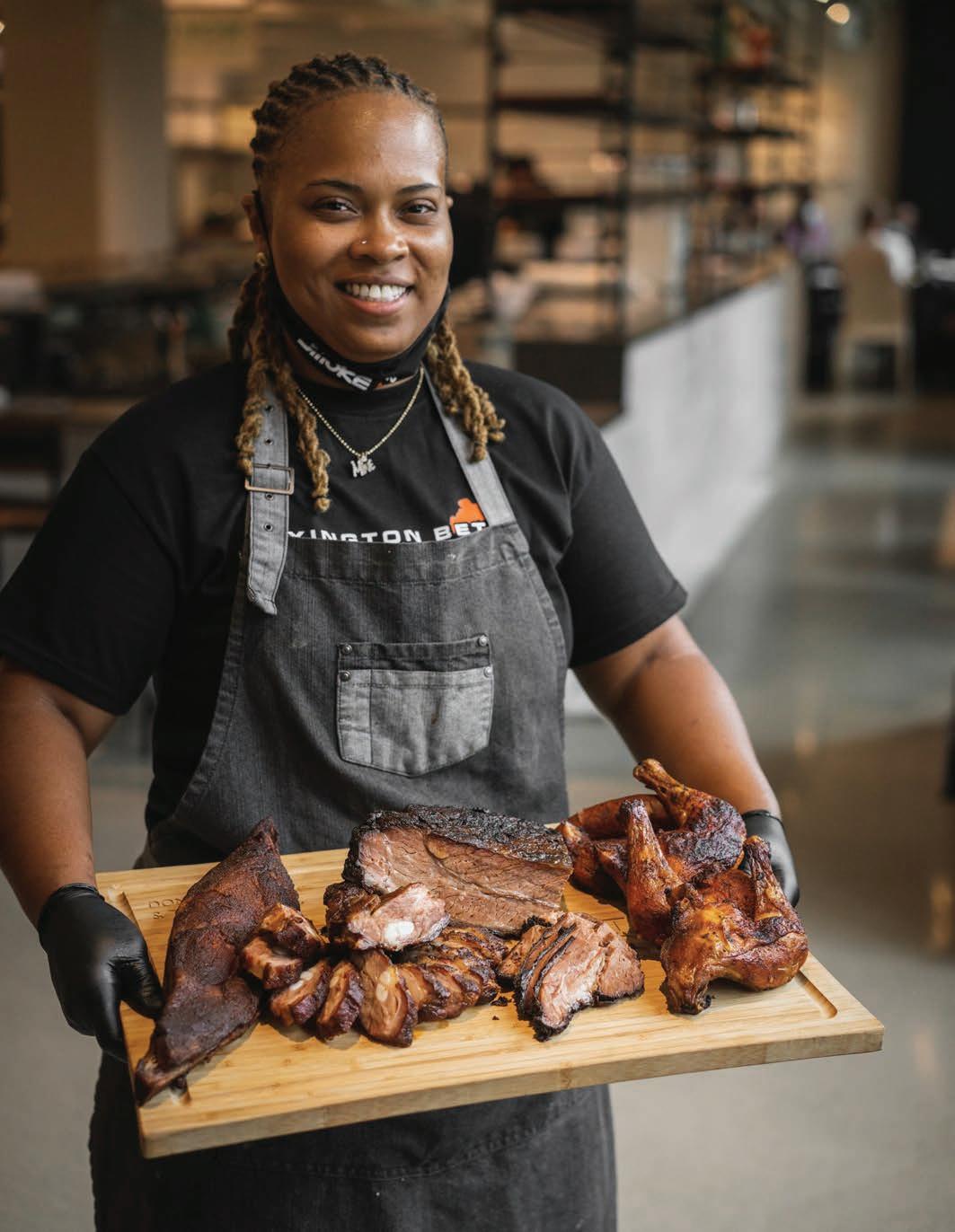
ediblechicago.com | 7
NOTABLE EDIBLE
Photo: GAZ Consulting + Design
The Future of Food is Collective
 By Mandy Moody | Photos: Green City Market / Tess Graham Photography
By Mandy Moody | Photos: Green City Market / Tess Graham Photography
Food insecurity, failing farms, food waste—no matter how you plate it, the current reality of our food system lacks sustenance.
“Food security — the ability to obtain and use sufficient amounts of safe and nutritious food,” per the USDA, “is a fundamental human need.” Yet climate change, as it creates increasingly erratic weather patterns, threatens to jeopardize our food sources and upend the livelihoods of Midwestern farmers who grow it. What’s more: government aid disproportionately supports industrial food businesses, leaving local, family farmers behind.
However, there is hope. The future of food is collaborative. It is cohesive, connected, and based in community. The future of food can be found at Chicago’s farmers markets.

continued
This page: Students tour Green City Market during the 2022 fall field trip program led by Green City's Programs Manager, Kristina Navarro.
Farmers markets can play a significant role in shaping the future of food in many ways:

Supporting Local Food Systems:
Farmers markets create a direct link between local farmers and consumers, promoting a local food economy. By buying directly from local producers, consumers support family-owned or community-led farms. Did you know that farmers and ranchers receive only 14.3 cents of every dollar that consumers spend on food at a conventional grocery store? Markets allow farmers to cut out the middleman and do business directly with consumers, preserving their profit, keeping food dollars local, and ensuring their businesses’ vitality.
Encouraging Sustainable Farming Practices:
Many farmers markets prioritize organic, sustainable, and regenerative farming practices. By providing a platform for small-scale farmers who adopt these methods, markets encourage the wider adoption of environmentally friendly practices in agriculture. Chicago’s markets nourish both our people and our planet.
Improving Food Security:
Most farmers markets in Chicago accept a variety of nutrition incentive programs including SNAP (Supplemental Nutrition Assistance Program), WIC (Special Supplemental Nutrition Program for Women, Infants, and Children), and SFNMP (Seniors Farmers' Market Nutrition Program) to reduce food insecurity and improve accessibility and affordability
of nutritious, fresh food. Several markets augment these programs through partnerships with Link Up Illinois, a program of Experimental Station, that matches purchases of fresh fruits and vegetables. Further, some markets, such as Green City Market, increase SNAP purchases 2:1, transforming $25 of SNAP benefits into $75 of purchasing power through the support of donors.
Preserving Biodiversity:
Farmers markets often showcase heirloom and traditional varieties of fruits, vegetables, and livestock breeds. This helps preserve biodiversity by supporting the cultivation of diverse crops and breeds, which may be more resilient to pests, diseases, and climate change.
Educating Consumers:
Farmers markets offer an opportunity for consumers to learn about where their food comes from, how it's grown, and the challenges farmers face. This increased awareness can lead to more informed choices and an appreciation for the efforts involved in producing food.
Reducing Food Waste:
With shorter supply chains and fresher produce, farmers markets can help reduce food waste. Consumers can buy in smaller quantities, and farmers can sell less visually perfect but equally nutritious produce that otherwise go to waste. Additionally, several markets throughout the city partner with food recovery organizations to rescue and redistribute food throughout our communities via mutual aid networks and food pantries.
10 | EDIBLE CHICAGO FALL 202 3
Above: Shopper purchases fresh produce from Flatwater Farms of Buchanan, MI.
Promoting Healthier Eating Habits:
Farmers markets emphasize fresh, seasonal, and locally grown produce, which often results in healthier food choices for consumers. Encouraging a diet rich in fresh fruits and vegetables can contribute to improved public health outcomes.
Fostering Community Interaction:
Farmers markets serve as social hubs where people from diverse backgrounds can come together to purchase and enjoy culturally-relevant food. This fosters a sense of community and connection with food, farmers, and local traditions.
Adapting to Changing Preferences:
Farmers markets are often more adaptable and responsive to changing consumer preferences and food trends. They can quickly introduce new products and respond to demand for specialty or niche items. Restaurateurs and chefs frequent markets and build connections with farmers to curate seasonal ingredients for their menus.
Incubating Local Food Businesses:
Farmers markets can be a stepping stone for small-scale food entrepreneurs to test their products and business concepts without the significant investment required for a brick-and-mortar store. This can promote innovation and diversity in the food industry.

Influencing Policy and Food Systems:
Farmers markets can become influential voices in advocating for policies that support sustainable agriculture, local food systems, and better food access through their vast community connections. Chicago boasts dozens of farmers markets – some planned by the city itself, others organized by nonprofits, chambers of commerce, and still more organized by neighbors.
All seemingly independent, these markets are unified through the Chicago Farmers Market Collective. A volunteer-facilitated, community-driven group, CFMC is composed of market managers and staff from across the city who come together, united by the mission to advance the local food economy through a network of communitybased farmers markets in the City of Chicago and a common goal to provide all Chicagoans with access to nutritious, locally-grown food. Market managers from Rogers Park to Englewood, from Austin to Lincoln Park, and everywhere in between, log onto Zoom each month to openly share resources and knowledge to uplift Chicago’s food system through its vibrant, diverse farmers markets. Operating farmers markets is a complex undertaking and this connectedness alleviates burdens shared by market managers.
Overall, Chicago’s farmers markets contribute to a more sustainable, resilient, and community-oriented future of food, fostering a deeper connection between consumers and the sources of their food while
promoting environmentally responsible and socially equitable practices in agriculture. By embracing our connectedness, we can set the table for a more equitable, sustainable local food future in Chicago.
About Chicago Farmers Market Collective
The Chicago Farmers Market Collective (CFMC) is co-facilitated by Mandy Moody, Executive Director of Green City Market and Stef Funk, Civic Engagement Manager of the Chicago Food Policy Action Council. Forty markets across the city participate regularly in the collective in addition to a number of community partners. CFMC’s mission is to advance the local food economy through a network of community-based farmers markets in the City of Chicago. Learn more at www.chicagofarmersmarketcollective.org.
About Green City Market
Nonprofit Green City Market is proud to be a local food leader whose mission is to secure the future of food by deepening support for sustainable farmers, educating our community, and expanding access to locally-grown food. Beyond its world-renowned farmers market, GCM partners with individuals, nonprofits, corporations, and foundations to expand access to local food throughout Chicagoland. For more information, visit www.greencitymarket.org.
ediblechicago.com | 11 e
Kyle Jacobson, of Jacobson Family Farms, packed market produce to be donated through the market's Nourishing Neighbors program.
2023 CHICAGO FARMERS MARKET GUIDE
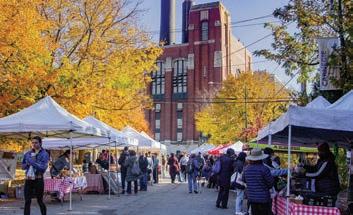
Sponsored by American Farmland Trust
MARKET DAYS: Monday, Tuesday, Wednesday, Thursday, Friday, Saturday, Sunday
61st Street Farmers Market
6100 S Blackstone Ave
Saturday 9 am - 2 pm
May 13 - October 28
61market.org

Crystal Lake Farmers Market
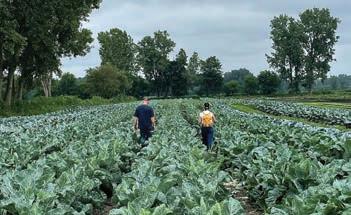
Depot Park 90 E. Woodstock St., Crystal Lake
Saturday 8 am - 1 pm
June 17 - September 30
downtowncl.org/events/
Austin Town Hall City Market
5610 W Lake St
Thursday 1 pm - 6 pm
June 8 - October 26
austintownhallcitymarket.com
Batavia Farmers Market
25 N River St, Batavia
Saturday 8 am - 12 pm
May 20 - October 28
downtownbatavia.com/ farmers-markets
Downtown Downers Grove Market
711 59th St., Downers Grove
Saturday 7 am - 12:30 pm
May 13 - October 21
ymcachicago.org
Edgewater Monday Market 5917 N. Broadway
Monday 3 pm - 7 pm
June 5- September 25
edgewater.org
Garfield Park
Neighborhood Market
Hatchery plaza, 135 N. Kedzie
Saturday 10 am - 2 pm
June - October
gpcommunitycouncil.org/ programs/
Elgin Farmers Market
Riverside Dr, Elgin
Friday 3 pm - 7 pm
May 13 - October 21
ymcachicago.org
Garfield Ridge Farmers Market
6554 S Archer Ave
Wednesday 3 pm - 7 pm
June - September
garfieldridgecc.com
American Farmland Trust (AFT) launched the conservation agriculture movement in 1980 and since then has protected nearly 7 million acres across the country. Today, AFT is the leading conservation organization dedicated to protecting farmland and ranchland, promoting environmentally sound farming practices, and keeping farmers and ranchers on the land. AFT founded the America’s Farmers Market Celebration™ which raises awareness of the role of farmers markets within local food systems. Learn more at markets.farmland.org
Elmhurst Farmers Market
541 S York St, Elmhurst
Wednesday 7 am - 1 pm
June 7 - October 25
elmhurstfarmersmarket.com
12 | EDIBLE CHICAGO FALL 202 3
Green City Market
Lincoln Park 1817 N Clark St.
Saturday 7 am - 1pm
Wednesday 7 am - 1 pm
May - October
greencitymarket.org
Horner Park Farmers Market 2741 West Montrose Avenue
Saturday 9 am - 1 pm
June 3 - October 14
farmersmarket.homerpark.org
Lincoln Square Farmers Market N Lincoln Ave &, W Leland Ave.
Tuesday 7 am - 12 pm
Thursday 3 pm - 7 pm
May - October
lincolnsquare.org/farmers-market
Green City Market West Loop
115 S Sangamon St.
Saturday 8 am - 1 pm
May - November
greencitymarket.org
Logan Square Farmers Market 3025-3113 W Logan Blvd
Sunday 9 am - 3 pm
May 14 - October 29
logansquarefarmersmarket.org
North Park Community Market
Peterson Elementary School, 5515 N. Kimball Avenue
Sunday 10 am - 2 pm
May 21 - October 8
northparkcommunitymarket. org
Naperville Farmers Market 200 E 5th Ave, Naperville
Saturday 7 am - 12 pm
June - October
napervillefarmersmarket.com
Northcenter Farmers Market 4100 N Damen Ave.

Saturday 8 am - 1 pm
June 10 - October 28
northcenterchamber.com/ northcenter-farmers-market
Soar Farmers Market
226 E Chicago Ave. 7 am - 2 pm
June 6 - October 31
soarchicago.org/soarfarmersmarket
Oak Park Farmers Market 460 Lake St, Oak Park
Saturday 7 am - 1 pm
May 20 - October 28
oak-park.us/our-community/ oak-park-farmers-market
Uptown Farmers Market 1250 W Sunnyside Ave.
Wednesday 2:30 pm - 7 pm
May 3 - November 1
uptownfarmersmarket.org
Portage Park Farmers Market
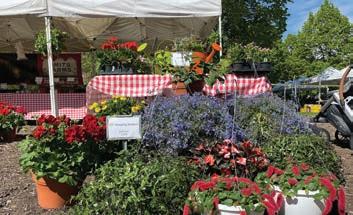
4000-4100 N. Long Ave.
Sunday 10 am - 2 pm
June 1 - October 1
The Woodstock Farmers Market

112 S Benton St, Woodstock
Saturday 8 am - 1 pm
April 29 - October
woodstockfarmersmarket.org
ediblechicago.com | 13
Shrub
Ginger Blueberry Mocktail
By Rachel Morrison Illustration by Emily Spurlin
Crisp ginger and blueberry shrub. Wildly refreshing. This nonalcoholic beverage still delivers a buzz from the 4mg of THC (delta-9) within the can of Crisp Ginger Plift. Substitute Plift with ginger ale if you would prefer to skip the buzz.
This recipe uses products from Chicagoland small businesses.
Ingredients:
1 Can of Crisp Ginger Plift
1 ounce of Joe's Blues x Fox Fire Kombucha Blueberry
Elderberry Shrub
One lime wedge
Thai basil (for garnish)
Blueberries (for garnish)

Ice
Instructions:
Fill a 12-ounce glass with ice
Pour 1 ounce of blueberry shrub into the glass
Fill the rest of the glass with Crisp Ginger Plift
Top with lime, fresh blueberries, and Thai basil leaves
Note: If you cannot find Thai basil, any variety will work.
14 | EDIBLE CHICAGO FALL 202 3
Plift:
Plift is a non-alcoholic, low-dose THC beverage for those that want to enjoy a drink socially, without alcohol. The brand launched at Wicker Park Fest with plans to roll out in liquor stores, restaurants, N/A bottle shops, and more throughout the city this fall. Plift is proud to be a black-owned and woman-owned brand and works tirelessly to make it easier for BIPOC-owned cannabis brands to get started in the industry.
Fox Fire Kombucha:
Owner, Michelle Atchue, began home brewing kombucha in 2017 and was inspired to launch a brand using local produce and seasonal flavors. Fox Fire Kombucha launched during the pandemic and can be found locally in Batavia, surrounding areas, and a few spots around Chicago.
Joe's Blues:
Joe's Blues (pictured) are naturally grown in Bangor, Michigan, and sold at farmers' markets throughout the city. In addition to the fresh blueberries, they offer multiple varieties of blueberry shrubs in partnership with Fox Fire Kombucha.

ediblechicago.com | 15
Photo: Green City Market and Tess Graham Photography
Bendición Bottle Shop
by JT Newman
Not far from Humboldt Park, on the Paseo Boricua (the "Puerto Rican Promenade"), in co-residence with The Succulent City, sits Bendición Bottle Shop. Bendición, the first completely dry "liquor store" in Chicago, is owned by queer, Latinx purveyor Cristina Torres.

Torres started her sobriety journey immediately preceding the pandemic and created Bendición as an occasional pop-up at The Native in Logan Square. "For the whole month of February 2022, we did [a happy hour] every Saturday from like 5:00 to 8:00, and there was a different event or theme for the night. I was really appreciative of working with them specifically because they were my 'home bar' when I was drinking. After I got sober, one of the bartenders reached out to me and he was like, 'Hey, I know you're sober now. But when everything opens back up, we're gonna have a non-alcoholic menu. So you can still come and hang out with us.'"
She continued, "I realized that there were not really a lot of sober things for me to do. Even with friends who didn't want to hang out with me, because it was either
'you go to the movies, and you go to bars', or 'you go to the restaurant, and you order drinks', or 'you go for a walk, and you end up at a bar', you know, it always ended up with drinking. And aside from things like going to a Starbucks or a library, there weren't really a lot of fun social things to do. And so because of that, I decided to do it myself."
In summer 2022, Torres launched a successful Kickstarter campaign and the shop began opening up last fall. Bendición carries a wide range of non-alcoholic beverages, from the standard 'replacement booze' and mixers like bitters to N/A beer and a small selection of CBD and THC drinks. Since its inception last fall, the shop has grown and grown. The popularity of the "sober curious" and "California sober' movements have caused an explosion in consumer demand for non-alcoholic options.
Torres has seen this growth in her shop. "We've definitely grown. We added a lot more shelving [since the beginning] and we've added a lot more products. And I think the way that I stock products in the
shop has changed. I'm very particular about the brands that I carry, and more specific and more intentional about who I work with. I like to stock a lot of brands that are women-owned or minority-owned, queerowned, and give them a spotlight. If there's a way that I can support any and all of my communities, I will."
This sense of community inspired Torres to curate a "hangout space" for anyone who drops in, with ample tables and chairs for approximately 20 people at a time. Torres likes to have people drop by the shop, co-work in the space, or bring friends to hang out and sample the products. She also created extensive programming, some BIPOC and LGBTQIA+ focused.
Bendición hopes to expand in the coming year, considering north-side spaces, and intends to create a partnership with UberEats to deliver inventory across the city.
Drop on by Bendición Bottle Shop, 2540 W. Division, any time Wednesday through Friday, 1:00 p.m. to 7:00 p.m., or Saturdays and Sundays beginning at noon.
16 | EDIBLE CHICAGO FALL 202 3
EDIBLE FINDS
e
Photo: Bendición Bottle Shop
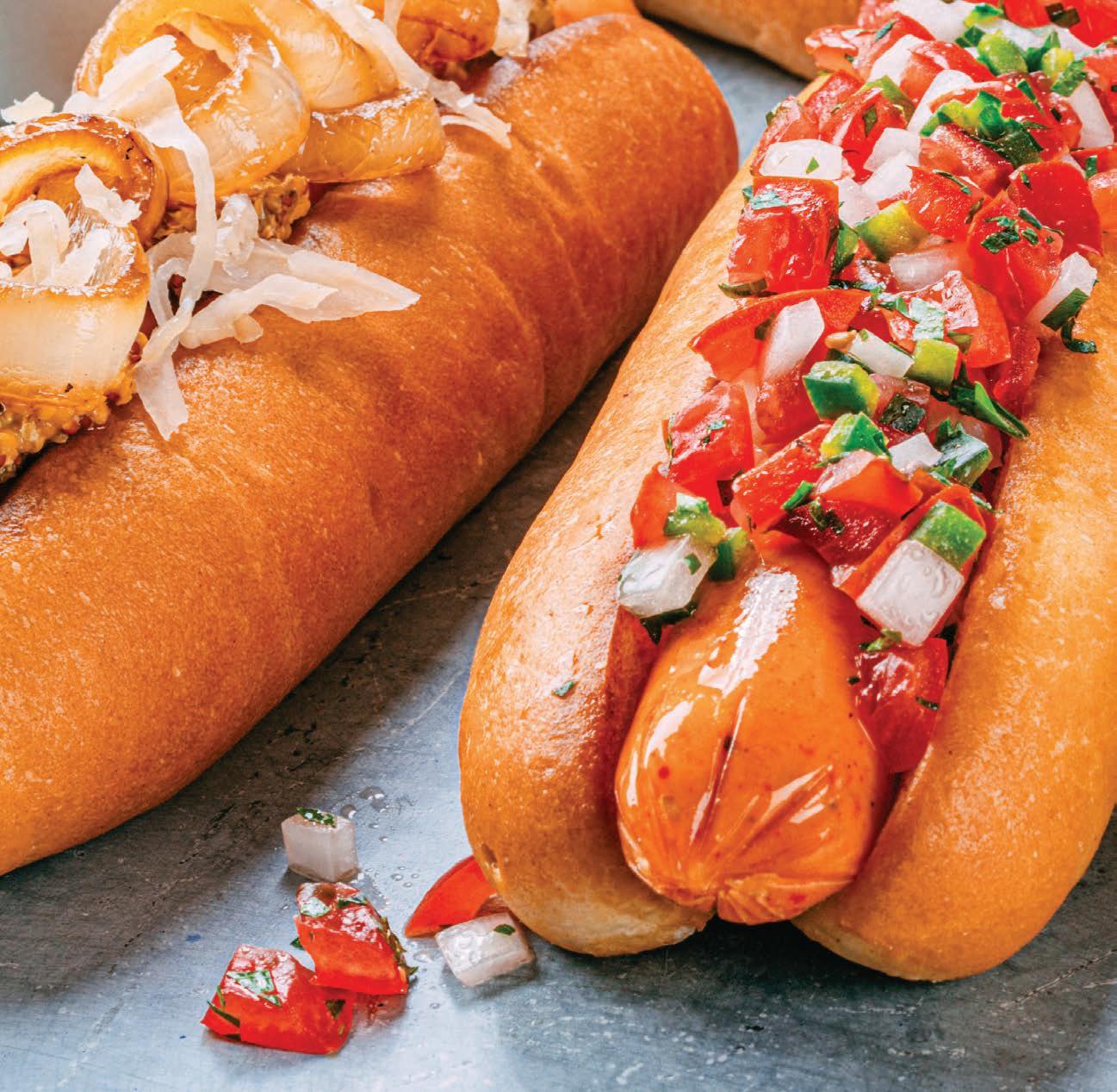


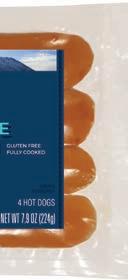
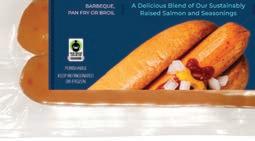















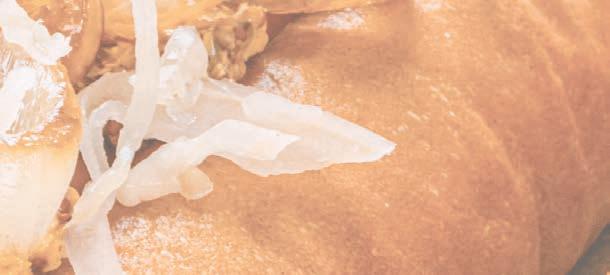
ediblechicago.com | 17 Find Kvarøy’s salmon hot dogs in the frozen section of the fish and seafood department at Whole Foods Market. Find a store near you OUR SALMON HOT DOGS ARE DELICIOUS, HEALTHY, AND SUSTAINABLE IN EVERY BITE! Proud supporter of Can a HOT DOG CHANGE the World?
CHICAGO The City That Loves to Grow
By JT Newman |
Photos by Megan Marshall
According to the Greater Chicago Food Depository, one in four children is experiencing food insecurity in Chicago this year. (This is up 25% from prepandemic levels.) It's viewable in real-time; if you drive past any food pantry before opening, there are lines around the block. The Depository provided 77.3 million meals, assisted 1.5 million households, and submitted 13,000 public benefits applications for our neighbors in 2021.
Google "community gardening" or "urban farming in Chicago," and you're sure to turn up hundreds of results about more than 600 locations where you can find a tiny plot of land to call your own. The city's motto, "Urbis in Horto," means "city in a garden," and the origin of the city's name (though contentiously debated about which native tribe it belongs to and which allium it refers to) roughly translates to a word ("chicagoua") for a native onion or garlic plant.
As the "City that Works " and, less recently, "Hog Butcher to the World," we're a city that loves to grow.
Community gardening and urban farming are essential tools of our collective food future. There are a growing number of community garden spaces in Chicago teaching people how to grow their plants and using these spaces to reconnect residents with the land surrounding them as they help feed neighbors. Chicagoans are

18 | EDIBLE CHICAGO FALL 202 3
CHICAGO GROWS
helping their neighbors to grow their own food and participating in food rescue and redistribution efforts to create more equitable food access across the city.
According to Ken Kastman, one of the five co-leaders at Edible Evanston, the Hillside Pantry serves about 2,000 families a month in their community. Edible Evanston and the broader collective, Evanston Grows, address food insecurity through community gardening, increasing access to locally-
grown produce, and building community connections. Kastman says these organizations work together with about 20 other social service, food, and community organizations in a web of support for fighting hunger in the suburbs.
Community gardens are much more than patches of land for residents to grow their food; they restore native plants, educate youth on ecology, and serve as a free food resource for anyone who needs it.
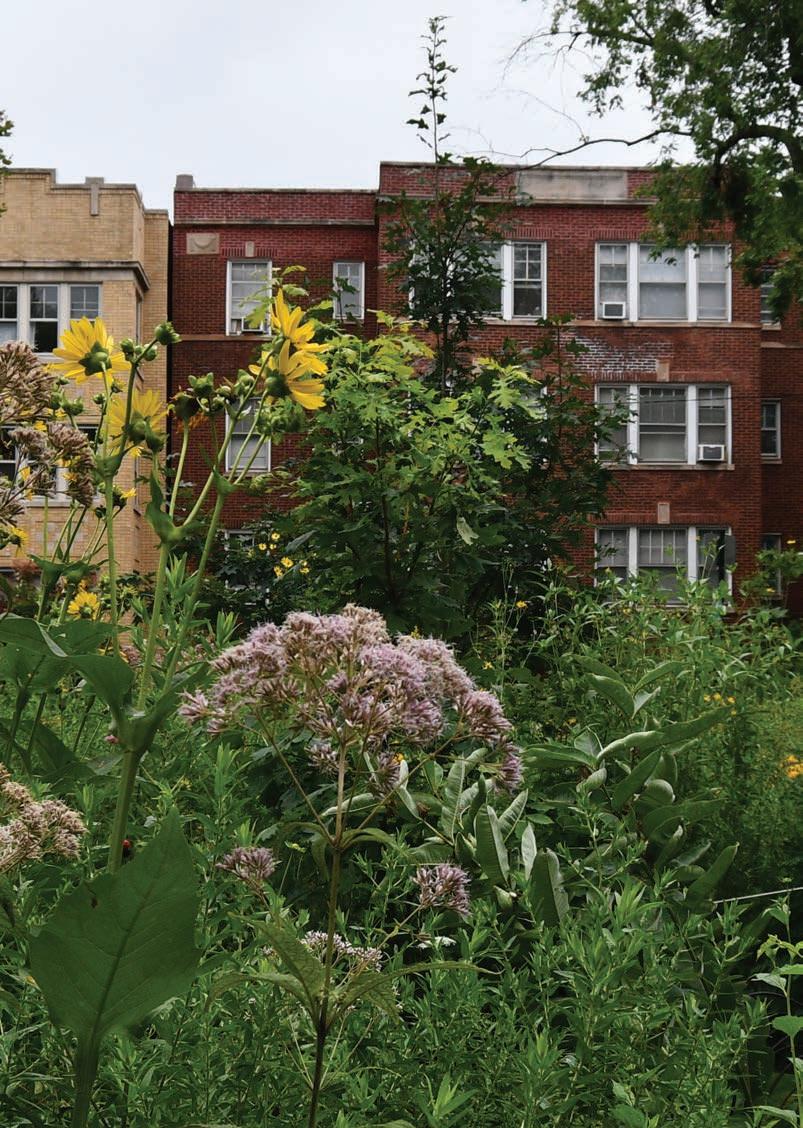
One such garden is on the grounds at Waters Elementary School in Lincoln Square. Started in 1991 by a group of parents and the local School Council, the Waters Garden is a testament to the power of community in creating natural, accessible spaces to plant, hang out, and grow and gather food. As a visitor enters this garden on Sunnyside between Campbell and Maplewood, near Western Avenue,, all signs of the city vanish. The garden envelops visitors in lush green, with dappled shade and various garden plots from students, neighbors, and garden volunteers.
I visited the garden to speak with Pete Leki, the former Director of the Ecology program at Waters and one of the leaders of the garden space. Leki tells me that this land used to be part of the Chicago River, that the north branch used to snake through here, right where we're standing. He points out four bur oak trees, which predate the city itself. Leki, who's been involved with the garden since the beginning, is incredibly knowledgeable about the ecology and intentionality of this place. He walks me past beehives, a grape arbor, clots of berry bushes pointing out ecological ecological features throughout the space. There's a lower section of the garden, right off the sports field, installed by the school, filled with native plants, that allows the rain to drain and filter through to the garden on the southern edge of the land. Leki pointed out the neighbor community garden plots scattered just past this section of the garden, and then the student plots just beyond.
ediblechicago.com | 19
In this ongoing series, Chicago Grows , Edible Chicago will explore urban agriculture and community gardening projects built to sustain the city and surrounding suburbs.
CHICAGO GROWS
When it originally started, Leki says this neighborhood was less gentrified, and there was a greater need for fruits and vegetables to help students supplement the food they brought from home or got through the school lunch program. While the needs of students seem to have lessened, they still walk through and eat berries and fruit. "There aren't any berries here when school is in session," Leki smiles.
This garden has been part of a delicate neighborhood ecosystem of helping to feed not only students and faculty but also neighbors and residents in need at nearby shelters. Leki notes that the school doesn't help sustain the garden during the summer months. Leki and other garden leaders organize a large team of volunteers who tend to the space each Saturday and Wednesday during the summer. Volunteers can take produce home with them following their shifts.
For as valuable as urban agriculture and community gardening is, resources are limited, and permitting creates roadblocks for new projects. These challenges drive some urban gardeners to move out of the city into more rural areas to pursue farming.
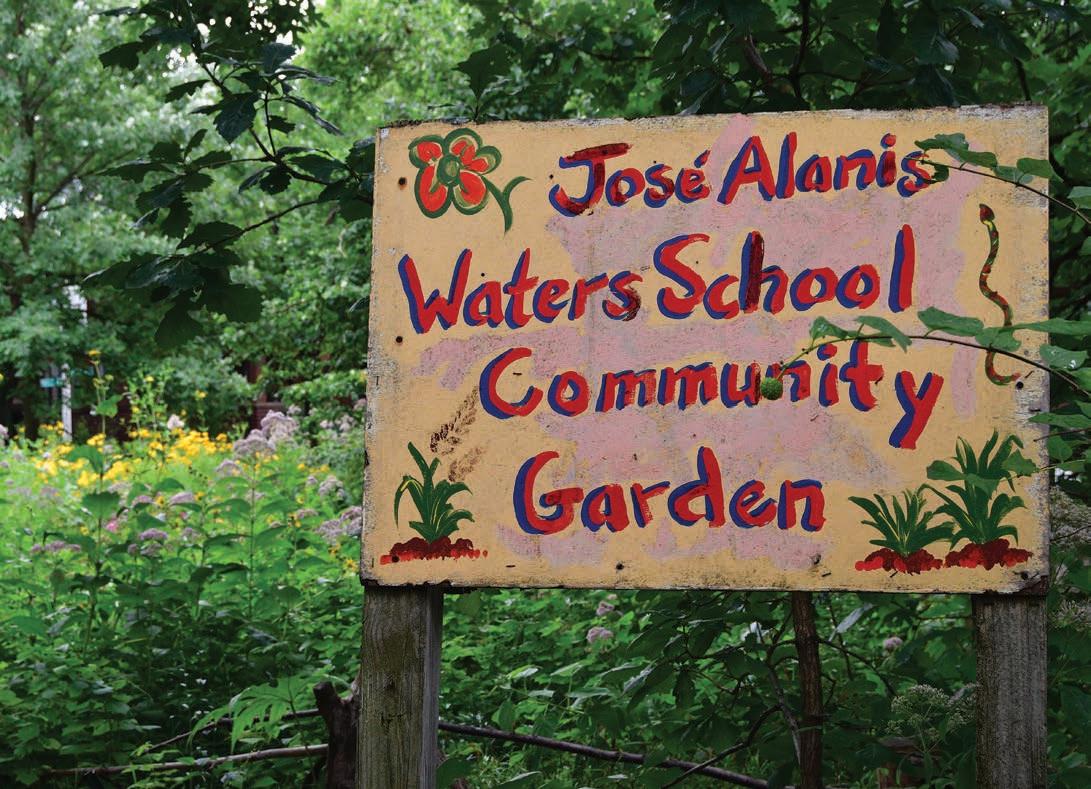
One such urban gardener-turned-rural farmer is Pamela Campbell of Hen and Hive Provisions. Growing up near Grand Rapids, MI, she ran an urban garden in her backyard in the Bay Area before returning to western Michigan. She runs a small, biodynamic farm and apiary growing medicinal plants, food, and native perennials organically while keeping multi-purpose herds of Nigora goats and Jacob sheep for fiber, fertilizer, and companionship. "I used to keep chickens in my yard in Oakland," she laughs.
Campbell grappled with the difficulties of establishing farming and gardening spaces in urban areas and pushed against the rapid
gentrification as well as neighbors who wanted to avoid seeing a bunch of 'weeds' in their manicured neighborhoods. Ultimately, she opted for a space closer to where she grew up. Campbell is among a growing movement of urbanites who bring themselves closer to nature by establishing small farms and businesses that utilize locally grown products and speak more to their values than conventional growing systems. She believes in the power of slowing down and appreciating the natural world.
Campbell explained, "We're just moving so quickly [as a society]. And I'm like, 'Back it up, people! Reverse reverse.' I just feel like there's so much value in connecting with the land. People have just lost their connection with the earth. There is value in connecting with plants and growing your own food. If people can grow their food, it is just magical."
e
20 | EDIBLE CHICAGO FALL 202 3
CHICAGO GROWS

Seco nd Spring Nettle and Matcha Cake
 By Emily Spurlin | Photos By Laura Scherb
By Emily Spurlin | Photos By Laura Scherb
Chicago is notorious for many things, one of which being its numerous micro seasons. There seem to be many shades and flavors of spring, summer and fall. Winter curiously has its hand in most of them. We are often forced to submit to the whims of our city, its climate and temperature undulating seemingly at random, bringing snow flurries in May or a searing heat wave smack dab in the middle of October.
One of my favorites is what I affectionately call Second Spring, not to be confused with Fool’s Spring or Spring of Deception, which typically occur in March and April, respectively.
Second Spring seems to arrive at exactly the right time, when we’re reeling from the sun-drenched frenzy of summer, but not quite ready to admit it’s all over. The chill in the air brings relief, quickly swallowed by dread of what’s to come.
It is not the same thing as fall, however. I equate fall with reds and yellows, apples, squash, pumpkins, persimmons. Warm golden days and chilly nights. Second spring is, well, a second…spring. As many of our peak summer plants are starting to wane, but before we start the endless months of root vegetables, the weather cools just enough to send a flush of new growth of earlier plants. Even at the farmers market, strawberries and raspberries reappear like a mirage.
As an herbalist, florist, and pastry chef who works with the medicinal plants that grow abundantly in the Chicago area, it’s an especially sweet time of year. The plants are beat down from the heat and gone to seed, and I’m exhausted from being out there with them, trying to maximize our short but glorious growing season. Ask any chef at your favorite restaurant: my bet is they’re not exactly mourning the end of patio season. For a split second of time, we get a second run with any herbalists’ favorite spring plants: stinging nettles, chickweed, purple dead nettle, dandelion, to name a few. These weeds are revered for being nutritional powerhouses, packed with all the vitamins and minerals needed to replenish our stores after a long winter. Or, to send us off into it. It feels like the earth is giving us one last boost of sustenance before entering the deep pause of winter.
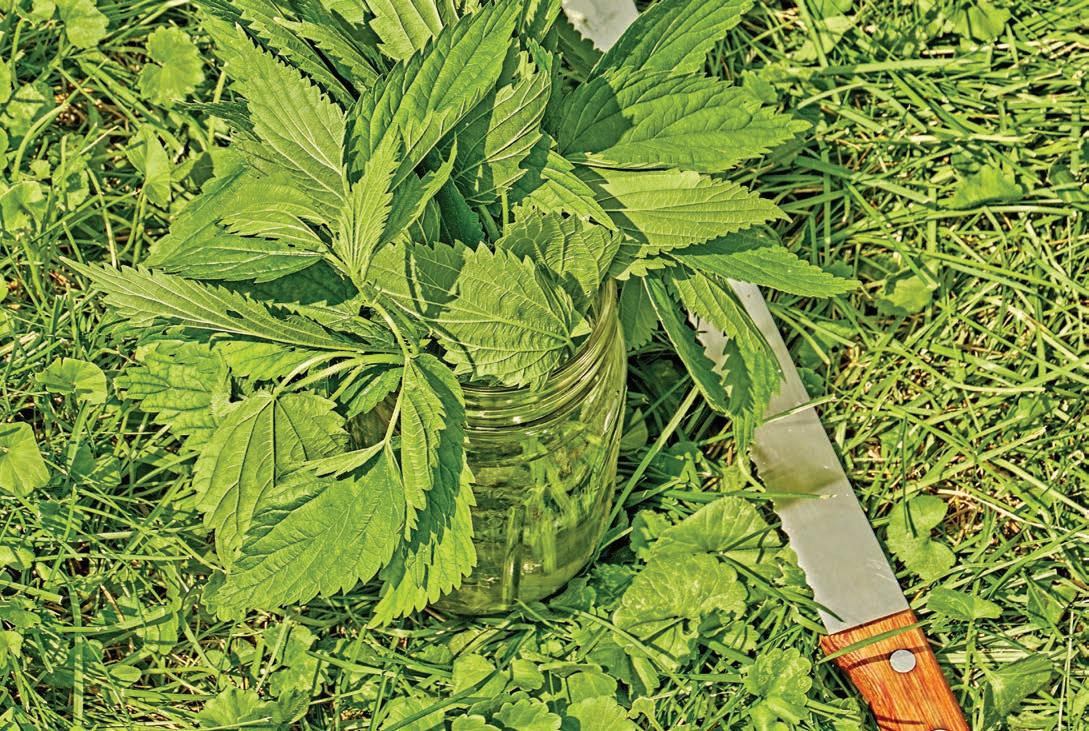
ediblechicago.com | 23 continued
And metaphorically, it delivers a poetic message - that every ending has the opportunity to be a fresh start. Decay always becomes life-giving compost for what’s to come. And that Chicago will do whatever she wants.
Here is a recipe that’s wonderful to bridge the gap between summer and fall. It has a bright, verdant flavor thanks to stinging nettle, lime, and matcha, and is also full of minerals and vitamins to bolster us before chillier times - I mean, it’s still cake, but let’s acknowledge eating our leafy greens when we can. It’s perfect for new beginnings, celebrations, and ordinary mornings at home.
As the name implies, stinging nettles do in fact sting. However, when dried or cooked, the stinging compound is deactivated. You can find stinging nettles when in season at the farmers market. Although the flavor is not as complex, spinach is a perfectly good substitute.

24 | EDIBLE CHICAGO FALL 202 3
Nettle and Matcha Cake
Yield: 8 -10 slices
FOR THE NETTLE CAKE
150 grams / 1 ¾ cups nettles
217 grams / 1 ½ cup all-purpose flour
2 eggs
45 grams / 3 T buttermilk
240 grams / 1 cup sugar
150 grams / 1/2 cup olive oil
6 grams / 1.5 teaspoon vanilla extract
4 grams / 1 teaspoon baking powder
2 gram / ½ teaspoon baking soda
3 grams / ½ teaspoon salt
Zest of 1 lime
Prepare nettles: Bring a large pot of salted water to a boil. Wearing gloves, strip nettle leaves from the stalk. Add the leaves to boiling water and blanch for 60 seconds, or until bright green. Strain, discarding cooking water. Rinse nettles under cool water until room temp. Cooking deactivates the stinging compound in nettles, so they are now safe to touch. Preheat the oven to 325 Fahrenheit. Grease a 9x5 loaf pan with olive oil, dust evenly with flour, and set aside.
In a large bowl, add sugar and lime zest, rubbing them together with your fingers until incorporated.
Place nettles, buttermilk, and olive oil into a blender or food processor, and blend until the mixture is completely smooth. Add the nettle mixture into the bowl of lime sugar and whisk until combined. Whisk in the eggs until emulsified.
In a smaller bowl, whisk together flour, baking powder, baking soda, and salt. Sift over the bowl of liquids. Fold the dry ingredients into the wet ingredients, enough to fully incorporate any lumps, but take care not to overmix. Pour batter into the prepared pan and bake until the top springs back when touched and a cake tester comes out clean, about 45 minutes. Cool in the loaf pan for 10 minutes, then turn out onto a rack to cool completely.
FOR THE MATCHA GLAZE
270 grams / 2 cups powdered sugar
2 grams / ½ teaspoon matcha powder
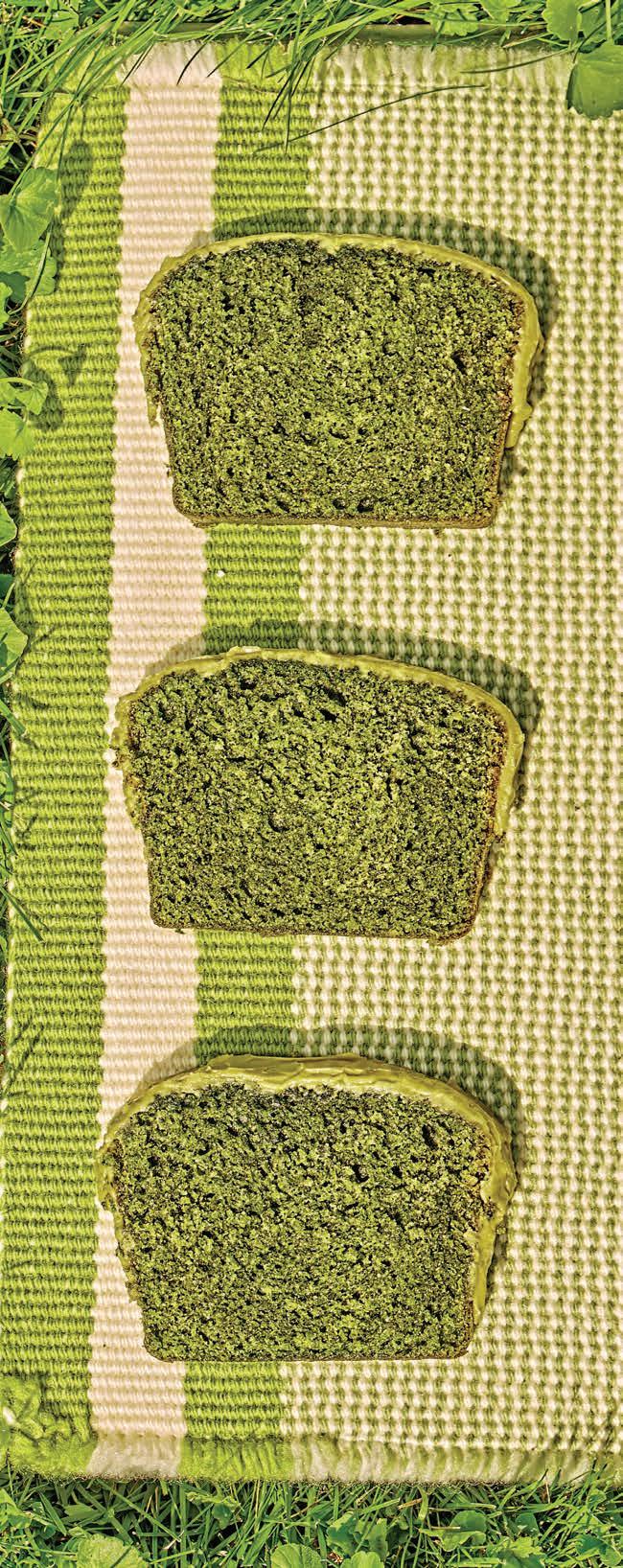
30 grams / 2 tablespoons lime juice
Strain lime juice into a large bowl.
In another bowl, sift powdered sugar and matcha together. Little by little, add powdered sugar into lime juice and mix until it comes together.
Add more liquid or more powdered sugar to adjust the consistency - it should seem very thick, but will still be glossy. Pour icing over the top of the cake, using a spoon or offset spatula to encourage the icing to drip down the sides.
ediblechicago.com | 25 continued
Heritage Prairie Farm
From Farm to Table Events to Growing 30+ Certified Organic Crops, Jessica Impson's Farm is a Lush Oasis Open to All
 By Ellen Osborne
Photo courtesy Heritage Prairie Farm
By Ellen Osborne
Photo courtesy Heritage Prairie Farm
Tucked off a rural road in Elburn, Illinois, just over an hour west of Chicago, sits a little organic farm that has become a community favorite for outdoor dining. Heritage Prairie Farm, a 7-acre organic haven, is more than just a farm–it's a retreat that beckons visitors to indulge in the flavors of farm-to-table dining. "It's always had this little bubble of light around the farm," owner Jessica Impson describes its magical quality. Historically a dairy farm, today, the farm grows over 30 certified organic crops a year, selling both at local farmers markets and through CSA boxes. But what makes Heritage Prairie Farm unique is its farm-totable events which range from family-friendly pizza nights to fully customized weddings for up to 250 guests.
Growing up in southern Illinois, Impson had farming in her blood but spent her twenties traveling and working in hospitality before moving to Kane County with her family. "I had been shopping at the farm for a while before I ran into the owner at the bank by chance. I loved the farm. I had always thought how lovely it would be to work there." Two days later, she was working there, and in 2015 she bought the farm. "I actually ran the business up, got them financially stable. And they moved out of the state. And that's when I bought it."
But it has been a challenging ride for Impson, as the farm's store was closed in 2021 and has since been transferred to an online-only platform. Customers can place their orders virtually and pick them up at the farm. Impson has had to downsize in some aspects in recent years; the farm used to keep animals such as goats, pigs, and chickens on the farm, but rising costs made it unsustainable to keep going. "It was really nice to be able to offer animal products that we raised, but we are fortunate to have a lot of really great local vendors that we work with to create menu options for our farm night dinners." Impson works hard to keep staff on year-round with fair and liveable wages.
ediblechicago.com | 27
Along with the charming lushness that envelopes the farm, Impson feels that its popularity with the community is due to its ability to offer "something a little bit different than just sitting in a restaurant." Eating outside where the food was grown and harvested was part of everyday life for generations, but today that connection is hard for many to experience firsthand. "Something as simple as eating dinner outside" is what Impson and her team are hoping to share with their guests that visit the farm for a meal. "It's an experience; we just want people to enjoy the farm. It's something that many people don't have the opportunity to do." During the popular pizza nights in the summer, families show up toting wagons with kids and big blankets. There is an ease to these evenings, with music, a tire swing, and barefoot kids running around while adults sip wine or beer and wait for their pizzas to be fired in the wood oven.
Dinners at the farm have a very communal feeling, with everything served family style on vintage platters that Impson has collected from estate sales and flea markets. The menu varies for each dinner, but previous menus have featured wild mushroom & fresh bruschetta crostini, stone fruit & arugula salads, pasta tossed with fresh-grown tomatoes, and roasted field vegetables. The farm team sets up long tables outside when the weather cooperates, creating an enchanting pastoral backdrop. And when things turn stormy, the farm has several spaces to keep the party going, from barns to party tents, to greenhouses and old goat stables.
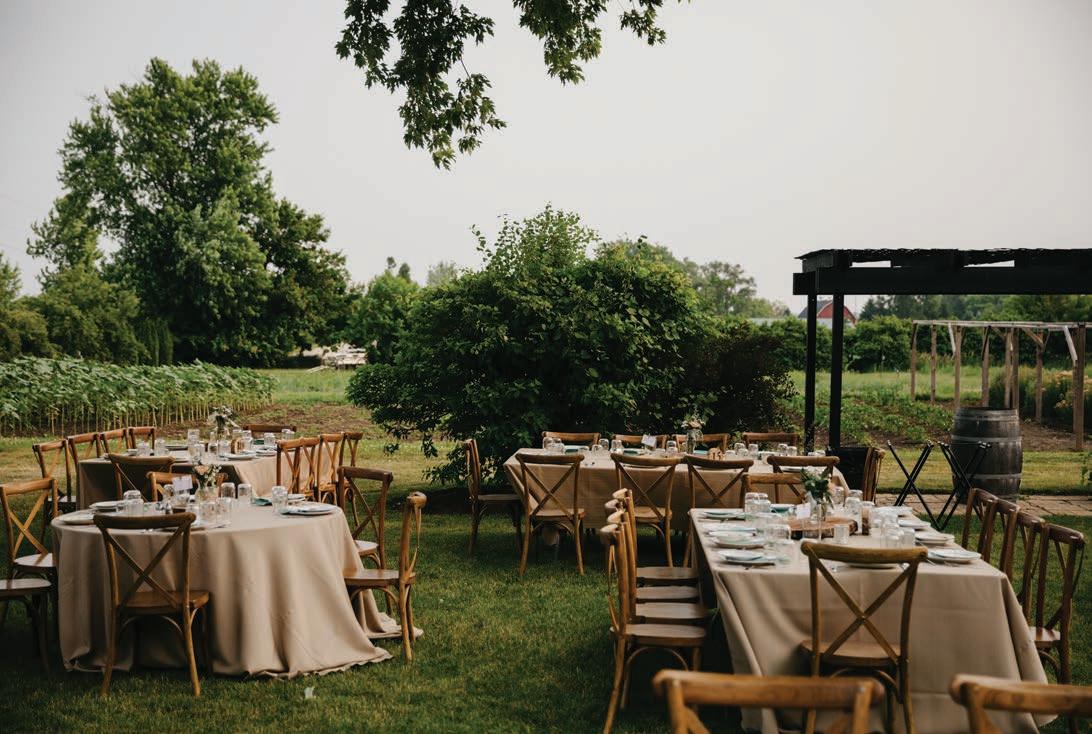
28 | EDIBLE CHICAGO FALL 202 3
Table settings (left) and succulent pork ribs (right) from Heritage Praire Farm's 11th Annual Pig Gig Farm Dinner June, 2022. Limited tickets remain at time of print for the Roots & Wine and Friendsgiving Farm Dinners coming fall 2023. Photos courtesy Heritage Prairie Farm.
The charm and idyllic feeling of Heritage Prairie Farm is so palpable that it feels like it was always this way. But Impson has worked hard for years, making it into the tranquil destination it is today. Farming organic vegetable crops in northern Illinois's short growing season is challenging. Impson says the farm is not eligible for any government support that commodity farmers receive.
The events the farm hosts are essential to keeping the farm operating, but as Impson states, "We couldn't have the farm without the events, and we can't have the events without the farm." It's crucial to Impson that the organic farm experience is authentic; it's not just a backdrop for social media; it's a real working farm focused on growing organic vegetables for the community and guests. In 2013, Impson decided to get certified organic for the farm, saying, "It was the right thing to do. We need more organic farms."
While the farm's private weddings tend to fill the calendar quickly, Heritage Prairie Farm's doors are open to the public for monthly farm dinners from April to November. "Our Chef, Joe Hetman, is really excited about building menus using food from the farm," says Impson. The Bar and Marketing Manager, David Olinger also focuses on crafting a drink menu that focuses on the farm's bounty. "For me, it's about starting with what's fresh and building flavor from there."
Olinger makes his syrups and juices for the bar and works with local breweries such as Alter Brewing in St. Charles, IL. The fresh cocktails are a big hit with guests, making the annual "Cocktail Dinner Party" a favorite among locals. Tickets go on sale in the spring and sell out fast. e
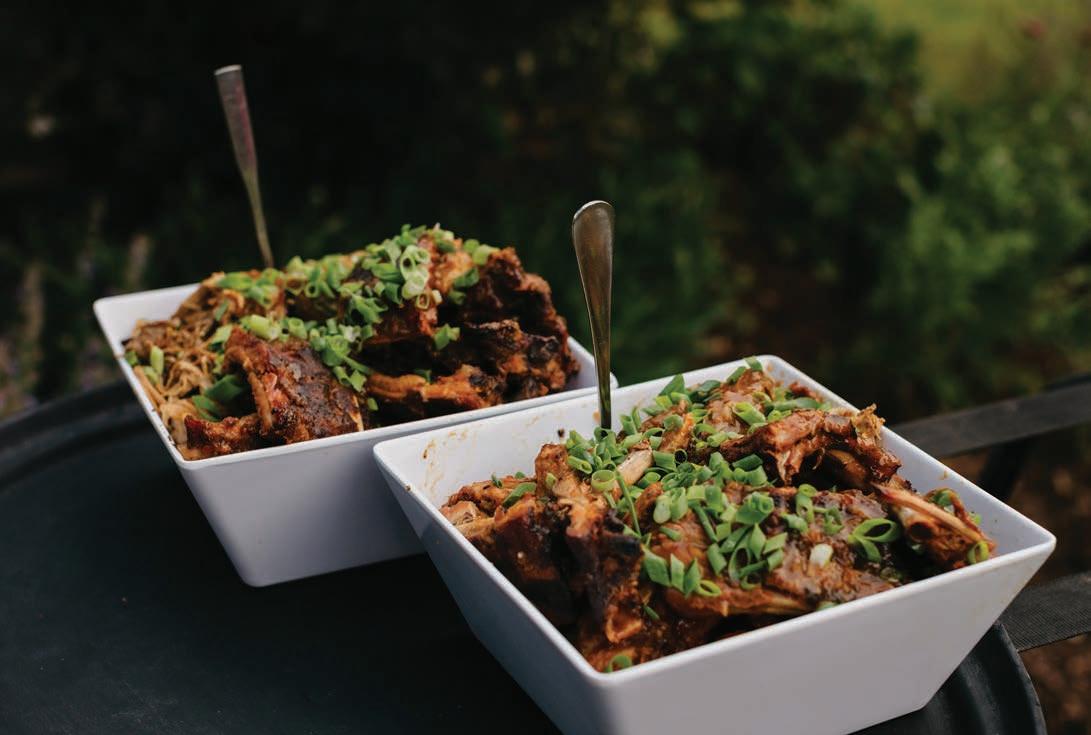
ediblechicago.com | 29







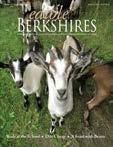
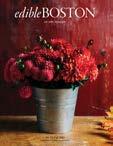


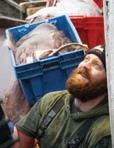

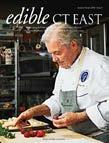
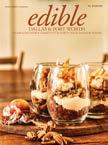
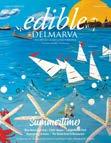
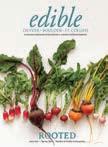



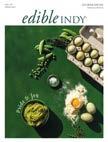
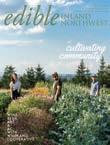
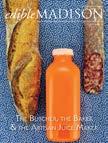




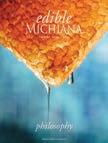
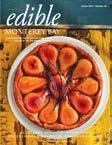

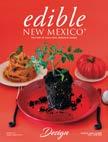
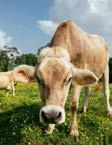

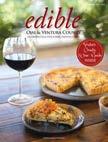




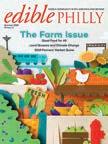
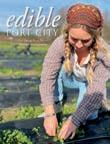
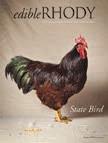
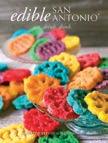

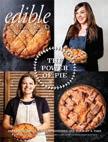
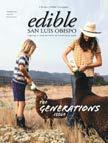




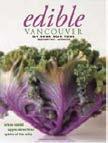



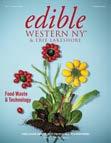

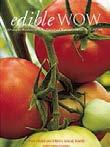
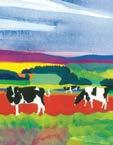
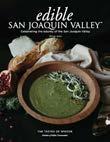
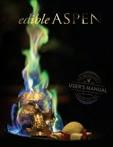
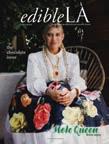

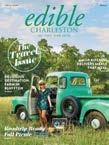


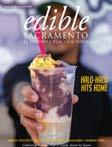





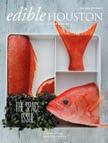
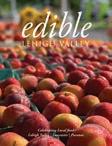
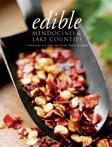
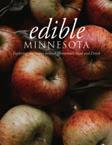
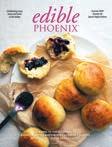
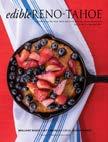

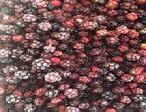


30 | EDIBLE CHICAGO FALL 202 3 Subscribe to our newsletter! Delivered to your inbox every other Saturday morning and filled with authentic stories and inspired recipes from Edible magazines across the U.S. and Canada. Join us as we celebrate local foods season by season! Get Social! Follow us by scanning the QR code above. edible BOZEMAN Telling the Stories of Local Food Drink The Kitchen Issue edible Cape Cod edible east end THE KITCHEN ISSUE AT WORK AND PLAY The future of food MILK & HONEY
the land ~ the sea ~ the people the food edible M aritimes Wild Finds edible newfoundland & labrador the land ~ the sea the people ~ the food Asparagus Marilyn Schlossbach Montclair Grape Debate CSAs Restaurant Guide Spring Destinations edibleJersey
THE KITCHEN ISSUE

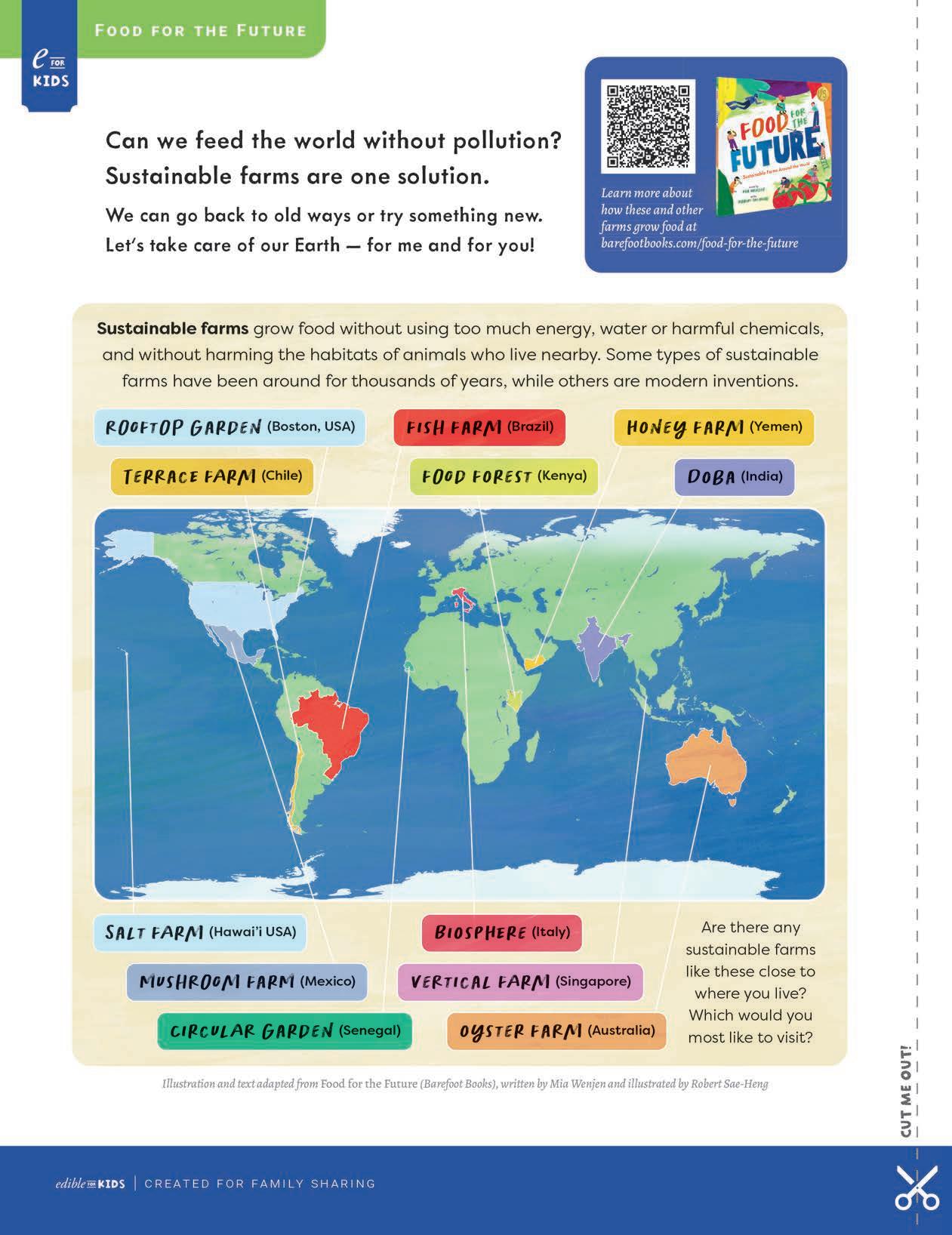
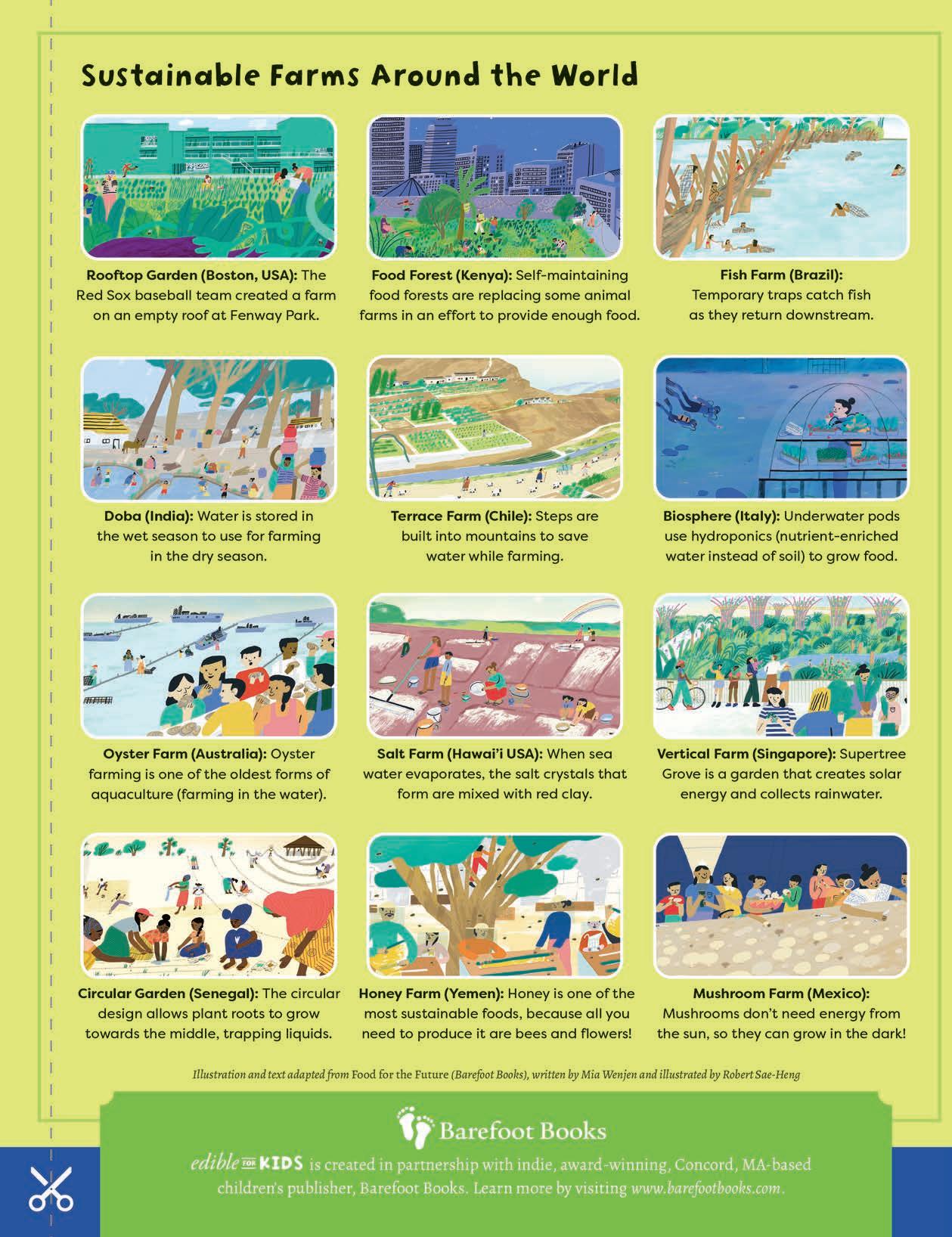
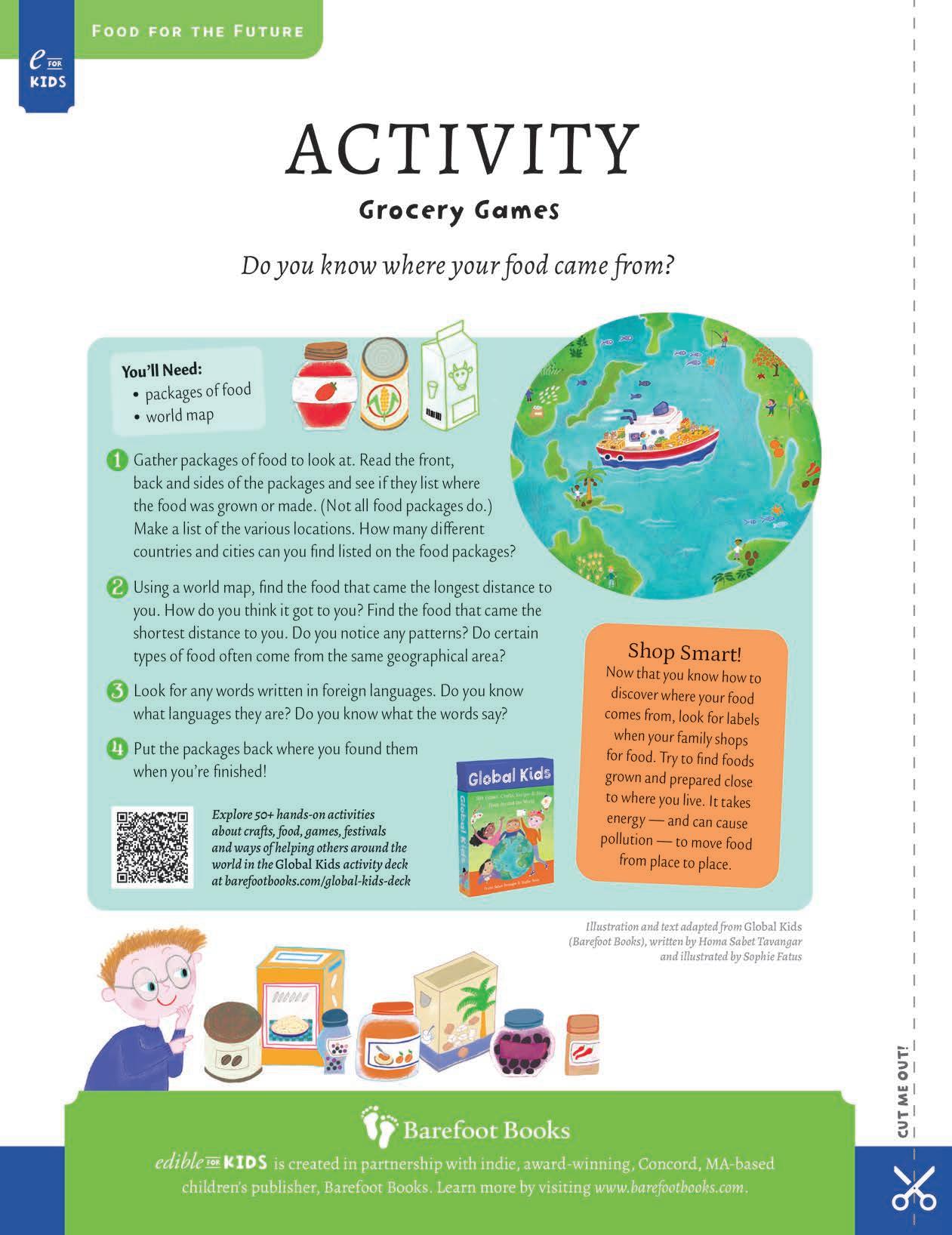
food for thought book club
INTRODUCTION BY MEGAN MARSHALL
We’re excited to kick off an ongoing collaboration with independent bookstores on a special Food for Thought Book Club series for Edible Chicago. The purpose of this series is to highlight the intersection of food, identity, and storytelling through a curated selection of cookbooks and accompanying non-fiction or fiction works that delve deeper into the social and cultural meanings of various food traditions.
This collaboration will provide our readers with a comprehensive reading list that enhances their understanding of the cultural significance of different cuisines. And, of course, it’s a great way to highlight our favorite independent bookstores across the city.
Our first Food for Thought Book Club selections are brought to you by City Lit Books.
City Lit Books originally opened in 2012. After a closure due to COVID-19, it reopened with new ownership in the summer of 2021, and is thrilled to be selling books in Logan Square again!
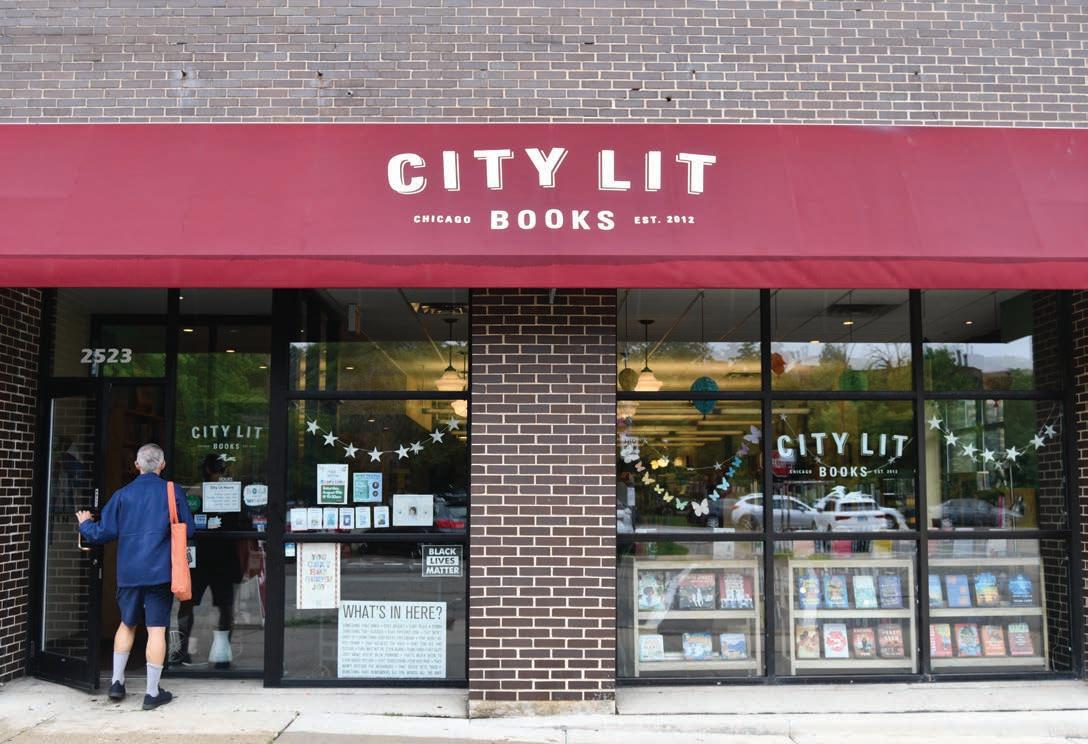
City Lit is a cozy independent bookstore specializing in contemporary fiction and non-fiction, with a richly curated collection of children's literature, speculative fiction, poetry, and more. Our store is a literary hub for the community, hosting many book clubs, poetry readings, and author events.
If you are a Chicagoland independent bookstore that would like to be considered for the series, please reach out to info@ediblechicago.com.
ediblechicago.com | 35
continued
CITY LIT BOOKS SELECTS:
Maangchi’s Big Book of Korean Cooking

Maangchi's Big Book of Korean Cooking is a comprehensive culinary guide authored by Maangchi, a renowned KoreanAmerican YouTube personality and chef. This book offers an extensive collection of authentic Korean recipes, accompanied by step-by-step instructions and vibrant visuals, allowing both beginners and seasoned cooks to explore and recreate the rich flavors of Korean cuisine in their own kitchens. With its user-friendly approach and diverse range of dishes, the book captures the essence of Korean cooking and culture.
COMPANION READS:
Crying in H Mart
by Michelle Zauner
Crying in H Mart is a poignant memoir, encompassing the author's emotional journey of loss, cultural identity, and connection to her mother through food and music, as she navigates grief and her Korean heritage within the aisles of a Korean supermarket.
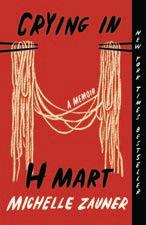 by Mary H.K. Choi
by Mary H.K. Choi
Yolk by Mary H.K. Choi is a gripping novel that follows the intertwined lives of two estranged Korean-American sisters as they navigate unexpected reunions, complex family dynamics, and the challenges of adulthood.
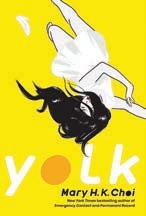
Pachinko spans generations and continents, following the lives of a Korean family in Japan. Against the backdrop of war, prejudice, and resilience, the novel explores themes of identity, love, and the unbreakable bonds that hold families together.
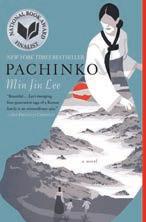
The Vegetarian revolves around Yeong-hye, a woman who decides to become a vegetarian after having a disturbing dream. This seemingly simple decision sets off a series of events that deeply affect her family and those around her.
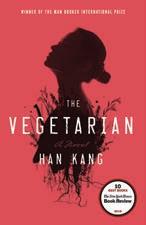
36 | EDIBLE CHICAGO FALL 202 3
Yolk
Pachinko by Min Jin Lee
The Vegetarian by Han Kang
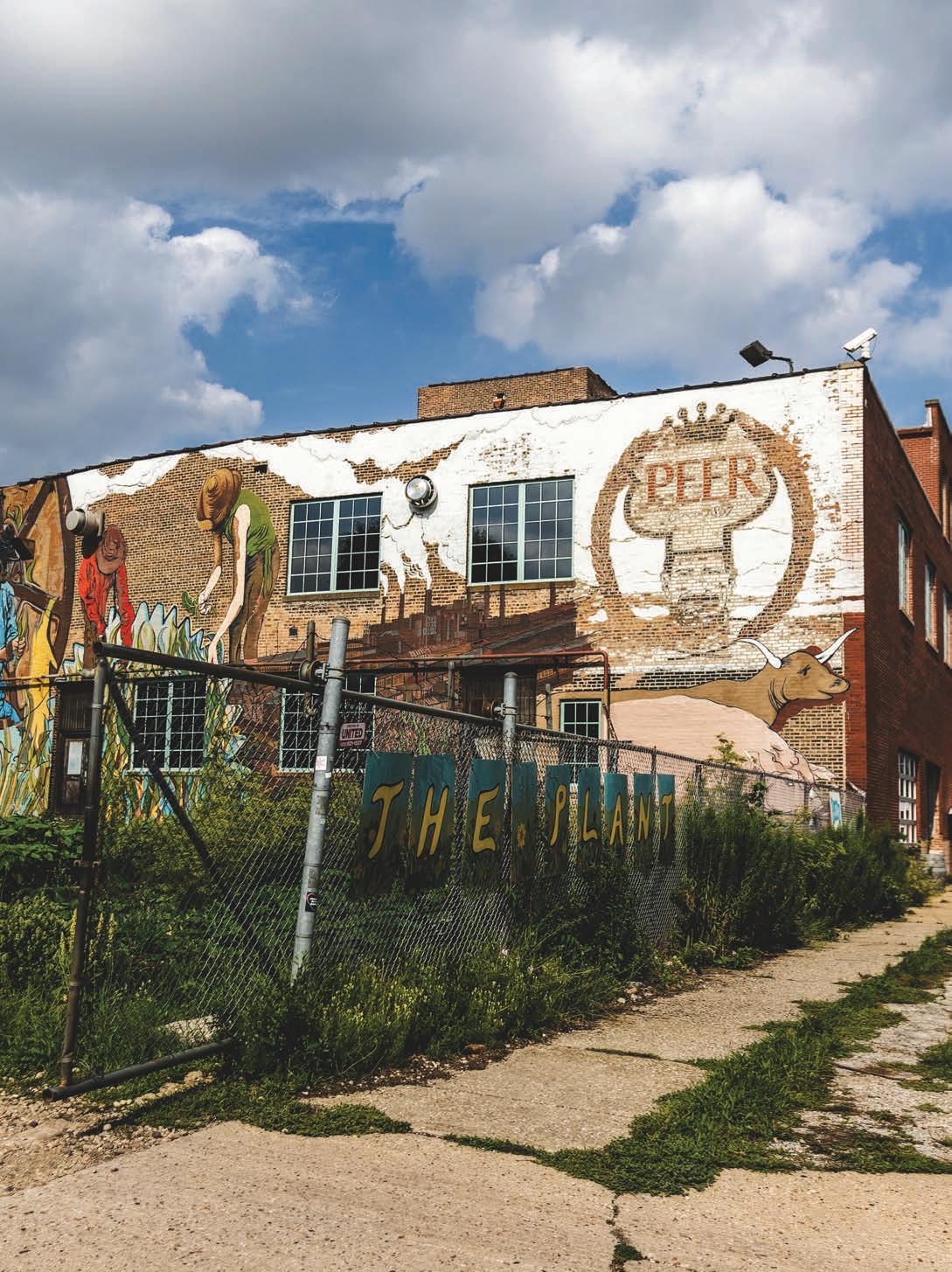
ediblechicago.com | 37 SECOND BITE Uncovering The Plant: A Revolutionary Journey from Stock Yards to Sustainable Incubator continued Story and photos by: Sara Faddah and Dario Durham
To tell you the remarkable story of The Plant, we must journey back to Christmas Day in 1865. After the Civil War, Chicago emerged as a thriving meat packing hub. Its strategic central location and the booming railroad industry made it the ideal destination for moving and processing livestock. As a result, numerous packing houses settled in the southwest side of Chicago, and it was here that the Union Stock Yards were founded by friends of Abraham Lincoln. The name not only symbolized the union of various packing houses but also paid tribute to preserving The Union after the Civil War.
Designed by Octave Chanute, a friend of the Wright Brothers, the Stock Yards' plans included organized rows of livestock pens spread across city blocks, each with its own designated address to prevent handlers from getting lost in the maze-like arrangement. The Chicago Tribune aptly labeled this system "organized chaos," which was just one of the revolutionary aspects that led to Chicago being dubbed the "hog butcher of the world" by Carl Sandburg.
Over the years, the Stock Yards garnered significant attention, with visitors ranging from the nephews of the Emperor of Japan to French stage actress Sarah Bernhardt, drawing crowds of up to 500,000 people annually. Butchering a steer that would typically take a skilled butcher around 12 hours was reduced to a mere 34 minutes at the Stock Yards, thanks to the implementation of the disassembly line. This innovation, in turn, inspired Henry Ford to create the assembly line following his visit to the Stock Yards.
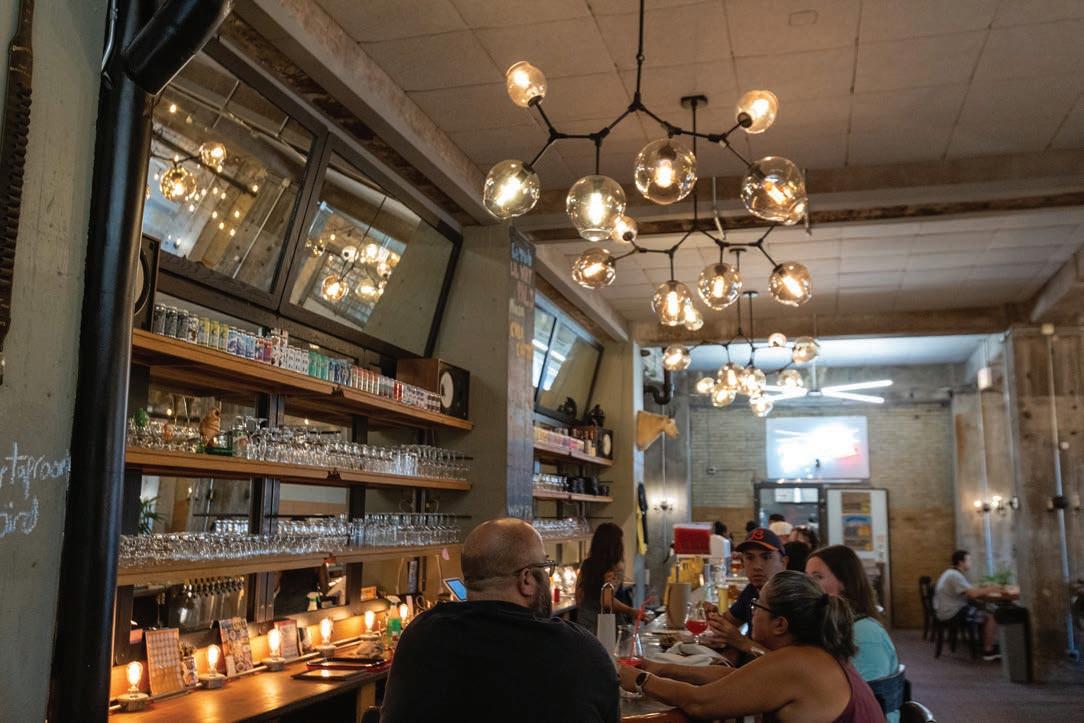
38 | EDIBLE CHICAGO FALL 202 3
SECOND BITE
Visitors enjoy draft selections at Whiner Beer's tap room. Whiner Beer is one of the 15+ collaborative food businesses focused on material reuse and closed loop systems that operate in The Plant.
At its peak in 1924, the Stock Yards covered a sprawling 475 acres and employed over 50,000 individuals, including men, women, and children. Throughout its impressive 105+ year history, over a billion head of livestock were unloaded in Chicago. However, by 1965, many of the prominent packing houses had already departed, setting off a chain reaction as others followed suit. Other cities learned from Chicago's model, and with improved local facilities, farmers no longer needed to transport their livestock long distances to be processed in Chicago. Consequently, the Union Stock Yards were officially shut down on July 30th, 1971, at midnight.
Today, the building that once housed Peer Foods stands transformed into The Plant, a living laboratory and a beacon of innovation. Arriving at the building, it's hard to believe that it was once a meat packer over 40 years ago. A faded "Peer Foods" mural now coexists with a new art piece depicting people harvesting plants, symbolizing the profound shift in purpose and vision.
The Plant is best thought of as an incubator for businesses focused on efficiency, combating climate change, and waste elimination. The structure, now situated in an area affected by food apartheid and lacking in healthy resources for the community, was acquired in 2010 by Bubbly Dynamics, a sustainable urban industrial developer. While some assumed the building would be stripped for parts and demolished, Bubbly Dynamics saw its potential as an incubator for food and farming-focused businesses, addressing food scarcity in the community and providing much-needed employment opportunities.

ediblechicago.com | 39
Photo: Bruce Cole
SECOND BITE
The Turtle Shop offers a variety of products made by businesses operating at The Plant. Products include small gift items, packaged goods, and grab-and-go breakfast and lunch items.
The Plant is nearly bursting at the seams with roughly 15 businesses and research labs. The diversity of endeavors is astounding. For example, the Whiner Beer Tap Room employs a system that captures CO2 from the brewing process and repurposes it in agricultural settings like indoor farms and algae bioreactors. Closed Loop Farms cultivates microgreens, herbs, and edible flowers for chefs across the city. Sacred Serve crafts plant-powered gelato using young coconut meat, superfoods, and medicinal mushrooms, while Back of the Yards Algae Sciences pioneers circular economy solutions based on microalgae for food and agriculture.
One of The Plant's highlights is the Packingtown Museum, curated by Professor and Dominic Pacyga, which sheds light on the history of the Union Stock Yards. The museum, situated on a floor where smoking rooms once operated, preserves the memory of the Stock Yards' heritage, with metal rails from the disassembly line still intact, acting as a poignant reminder of the past.
The dedication to sustainability and community extends beyond the building's walls. The Plant's anaerobic digester project, currently on hold due to funding, promises to provide food-waste processing alternatives to businesses in the surrounding urban industrial area and beyond once completed.
In under 15 years, The Plant has evolved into a collaborative community within its 100,000 sq. ft. facility. Visitors can enjoy drinks, great food, or peruse a vegan farmer's market, all while supporting innovative small businesses working toward a sustainable future. As The Plant stands strong on the southwest side of Chicago, it exemplifies a transformative journey from Stock Yards to a sustainable incubator, embracing progress while honoring its rich history. e

40 | EDIBLE CHICAGO FALL 202 3
Main entry to The Plant. The Plant is an active production facility. Visit insidetheplant.com/planavisit to view the event calendar and explore the latest opening times for the general public.
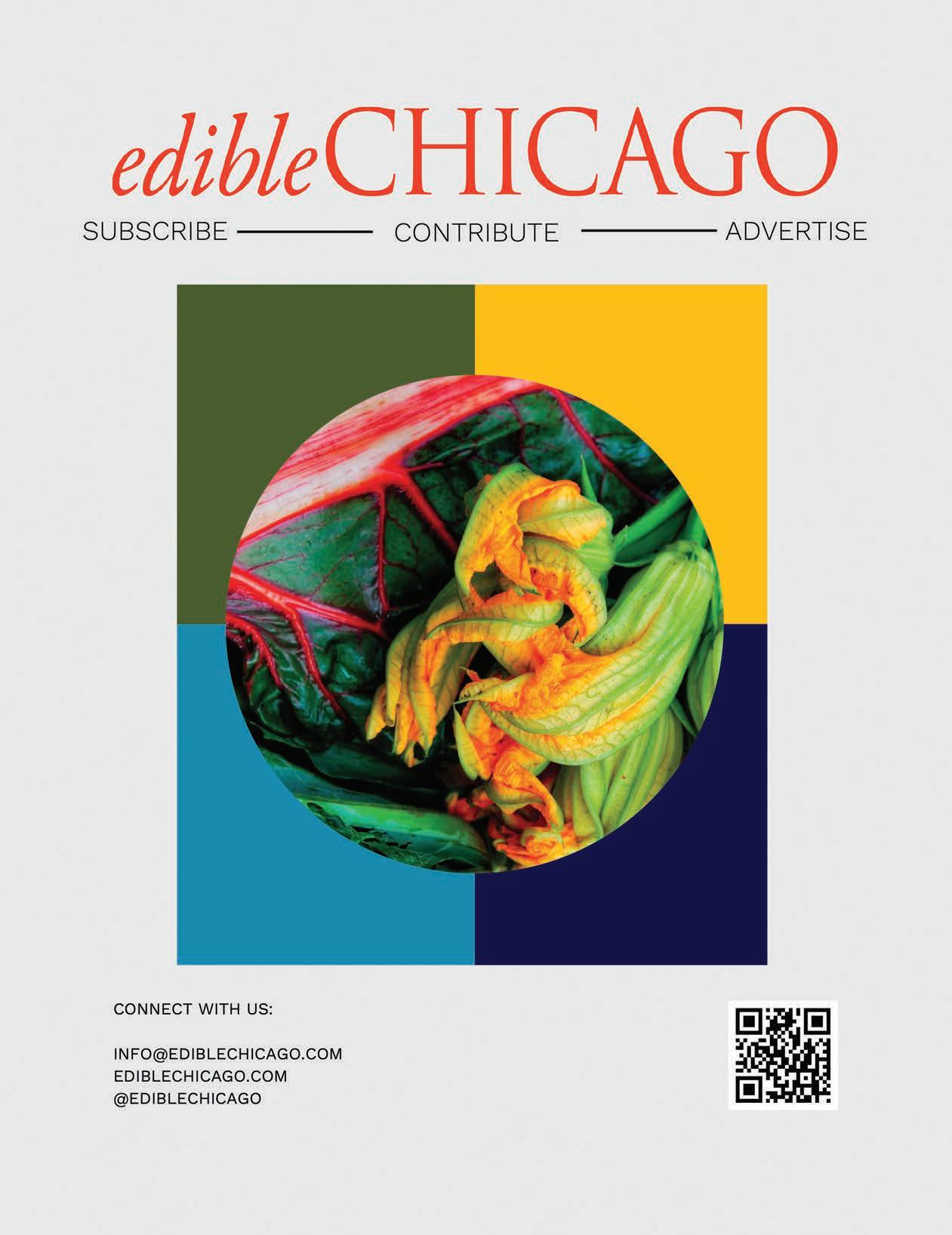



















 By Mandy Moody | Photos: Green City Market / Tess Graham Photography
By Mandy Moody | Photos: Green City Market / Tess Graham Photography





































 By Emily Spurlin | Photos By Laura Scherb
By Emily Spurlin | Photos By Laura Scherb



 By Ellen Osborne
Photo courtesy Heritage Prairie Farm
By Ellen Osborne
Photo courtesy Heritage Prairie Farm





















































































 by Mary H.K. Choi
by Mary H.K. Choi








